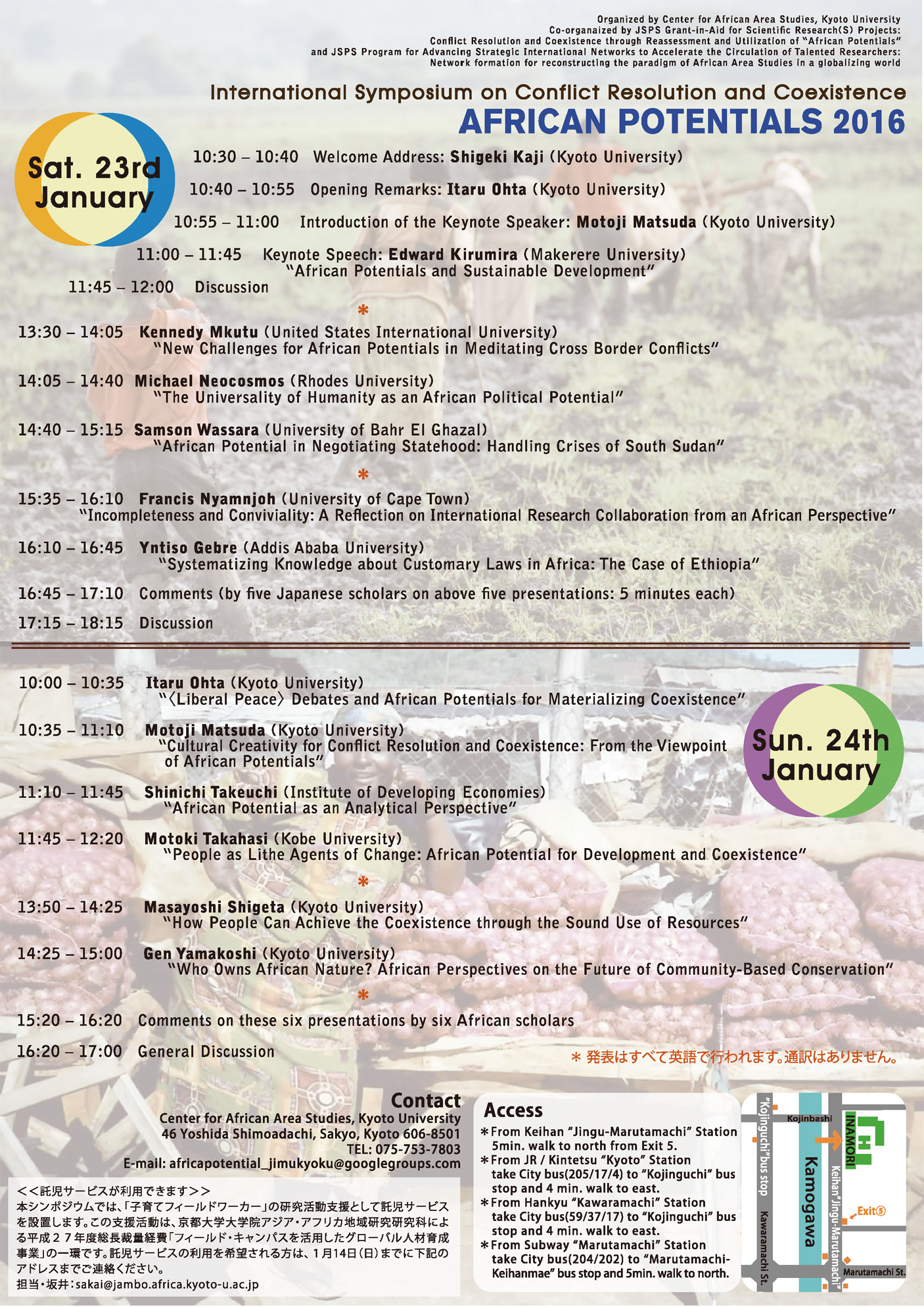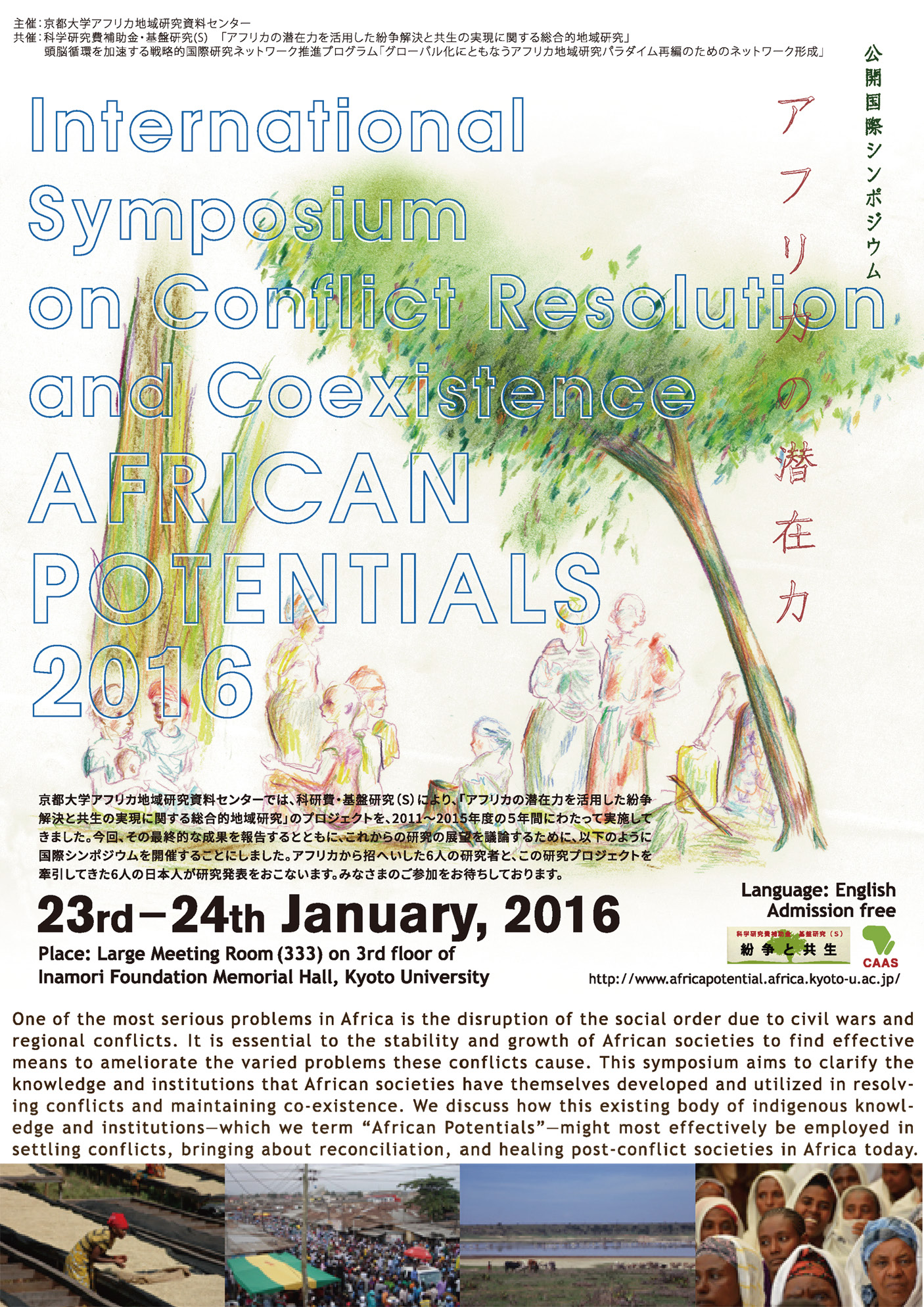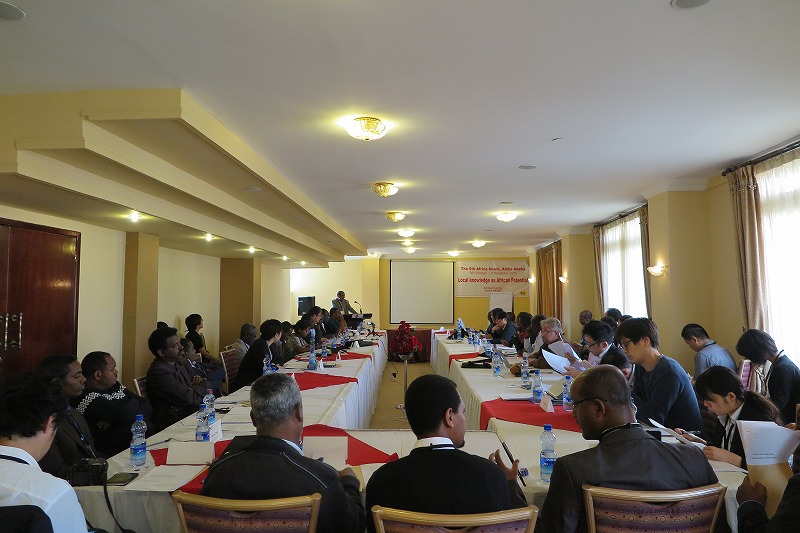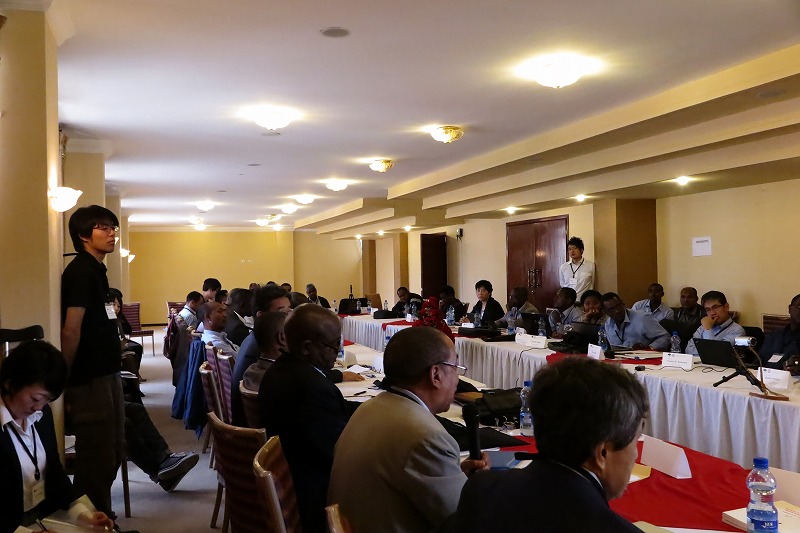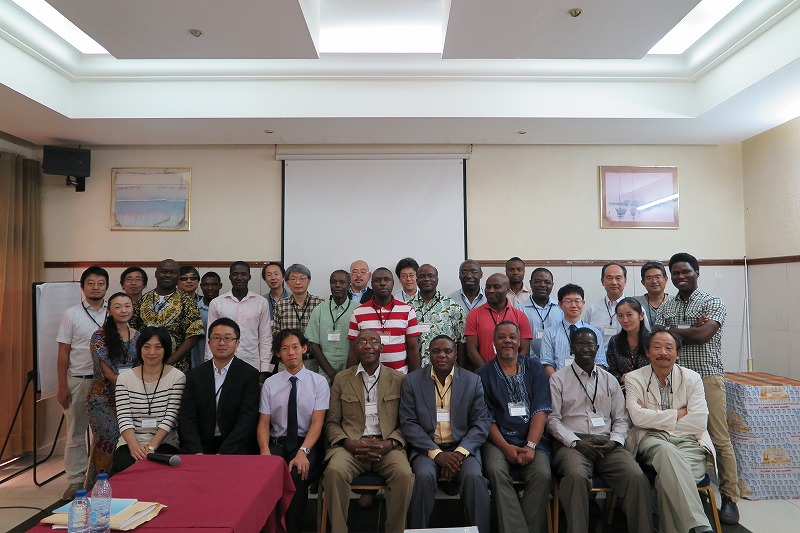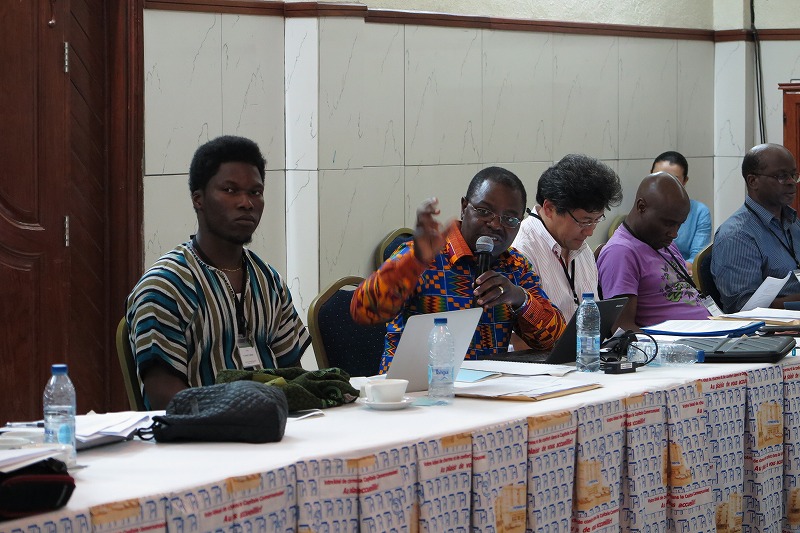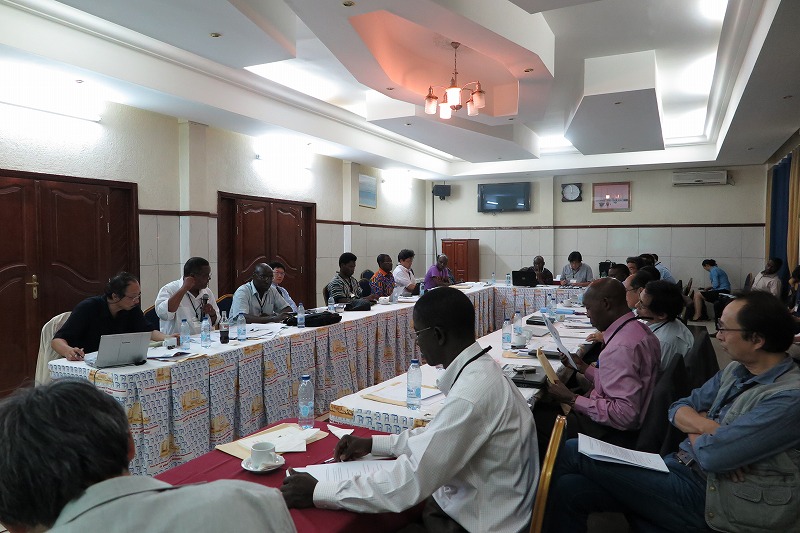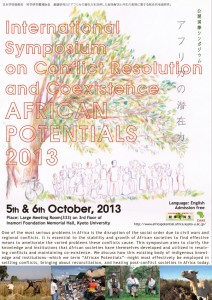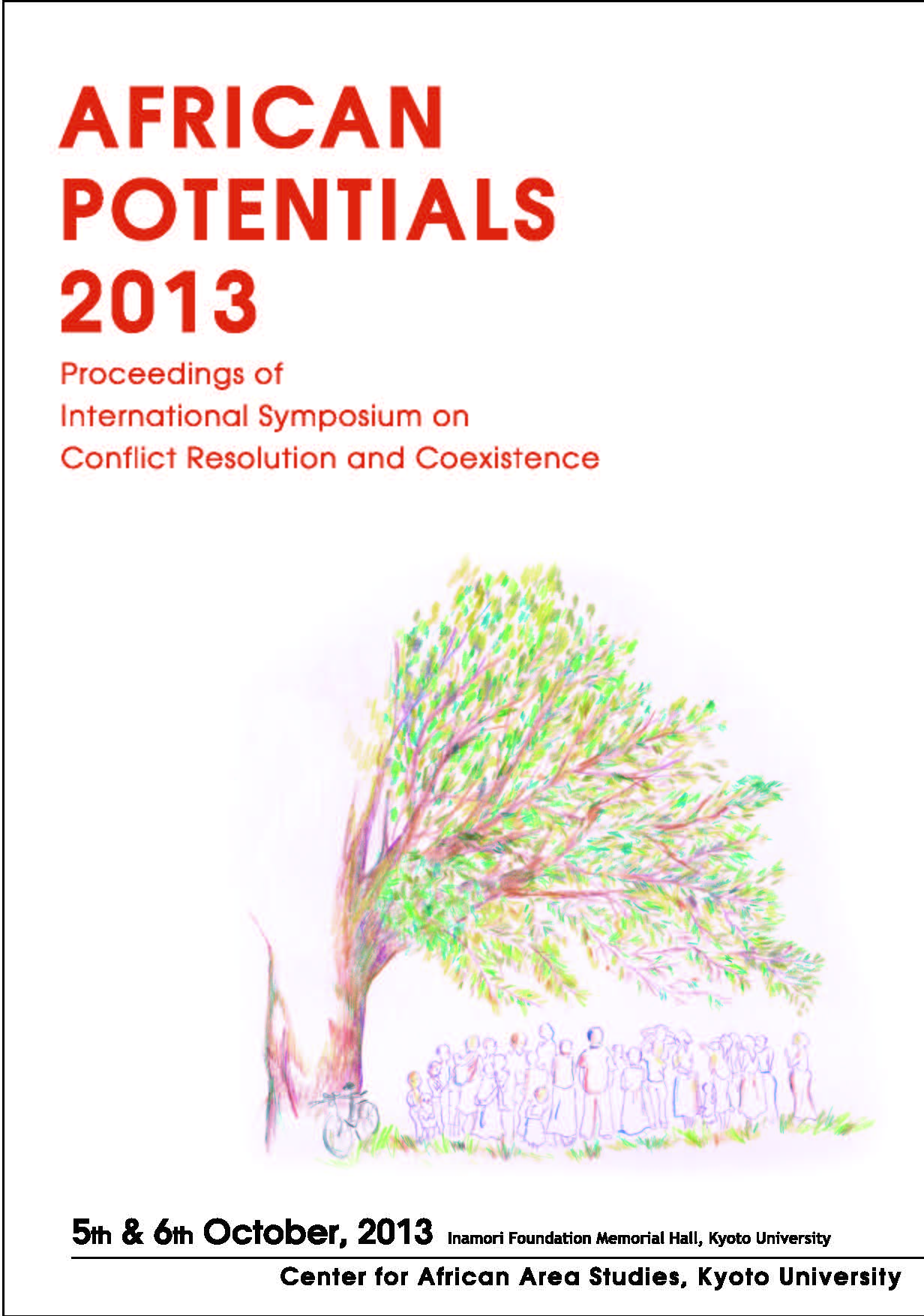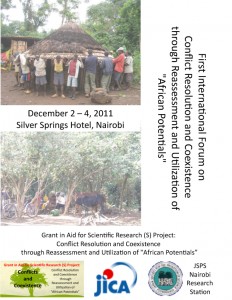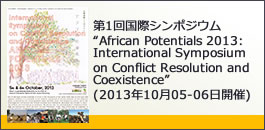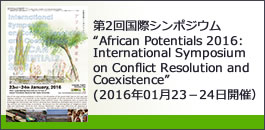- 研究活動
[第2回国際シンポジウム]「African Potentials 2016: International Symposium on Conflict Resolution and Coexistence」(2016年1月23-24日開催)
日 時:2016年1月23日(土)-24日(日)
場 所:京都大学稲盛財団記念館3階大会議室
概要
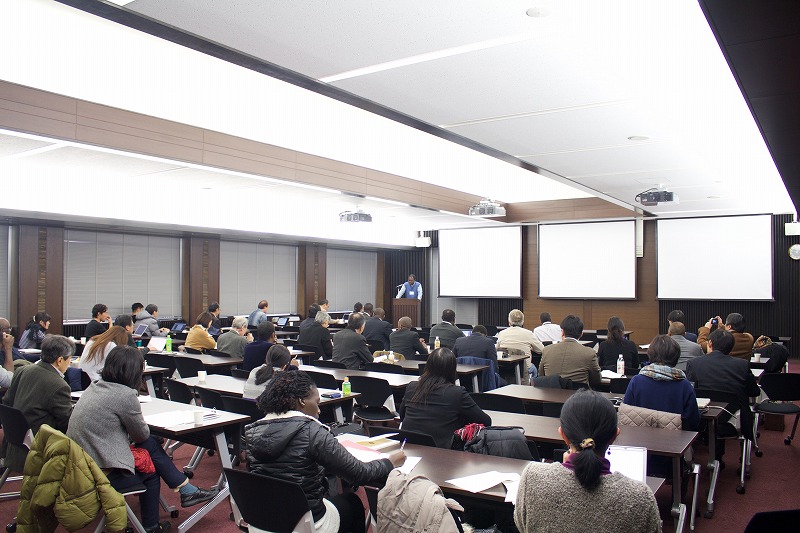
本研究プロジェクトは、2011年度から5年間にわたって実施してきましたが、その最後を締めくくる国際シンポジウムを開催しました。このシンポジウムの目的は、以下の2点にありました。
本プロジェクトでは、これまでに毎年一度、アフリカ各地で「アフリカの紛争と共生 国際フォーラム」を開催し、アフリカ人研究者・実務家の参加を得て「アフリカ潜在力」に関する議論を深めてきました。これまでに5回のフォーラムを開催したわけですが、そのプロセスにおいて、わたしたちの議論を常にリードし、「アフリカ潜在力」という考え方をともに彫琢してきた、「常連」ともいうべきアフリカ人研究者が登場してきました。今回の国際シンポジウムの第一の目的は、こうしたアフリカ人研究者の参加を得て、「アフリカ潜在力」とは何かに関する議論を集大成することでした。その「常連」とは以下の6人です。
- Edward Kirumira (Makerere University, Uganda)
- Kennedy Mkutu (United States International University, Kenya)
- Michael Neocosmos (Rhodes University, South Africa)
- Samson Wassara (University of Bahr El Ghazal, South Sudan)
- Francis Nyamnjoh (University of Cape Town, South Africa)
- Yntiso Gebre (Addis Ababa University, Ethiopia)
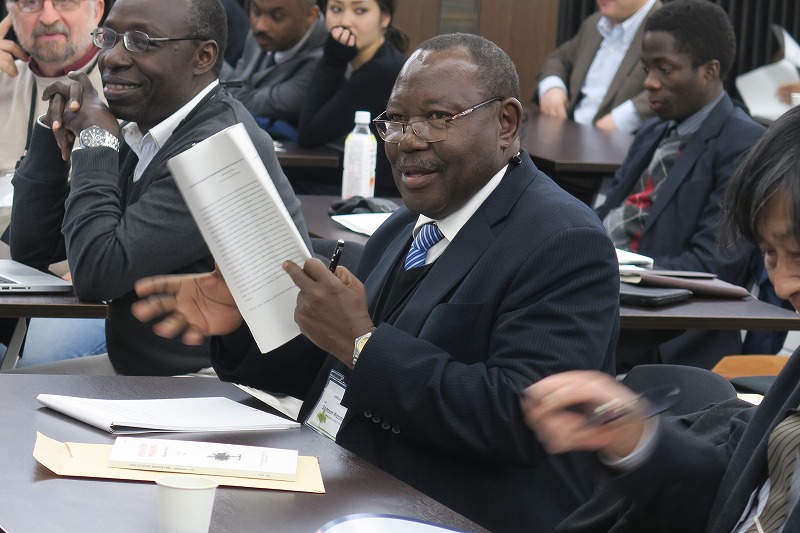
この国際シンポジウムの第二の目的は、5年間にわたる本プロジェクトにおいて日本人研究者が集積した成果を広く公表することでした。このプロジェクトには50人以上の日本人研究者が参加して「アフリカ潜在力」に関する探究を続けてきました。その成果は「アフリカ潜在力シリーズ」全5巻として、2016年3月末に京都大学学術出版会から公刊されます。このシンポジウムでは、本プロジェクトの代表者と上記5巻の編者を務めた5人の研究者が、いままでの研究成果にもとづいて「アフリカ潜在力」とは何かに関する考えを述べ、活発な議論をかわしました。
この国際シンポジウムの成果にもとづき、近い将来に英文で「アフリカ潜在力」に関する議論をまとめた書籍の出版を実現することも合意されました。
プログラム
2016年1月23日(土)
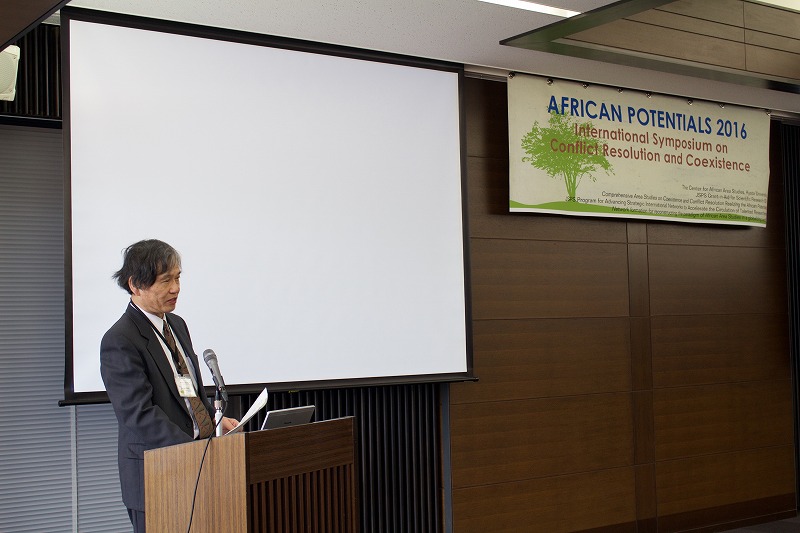
- 10:30 – 10:40
- Welcome Address: Shigeki Kaji (Kyoto University)
- 10:40 – 10:55
- Opening Remarks: Itaru Ohta (Kyoto University)
- 10:55 – 11:00
- Introduction of the Keynote Speaker: Motoji Matsuda (Kyoto University)
- 11:00 – 11:45
- Keynote Speech: Edward Kirumira (Makerere University)
African Potentials and Sustainable Development - 11:45 – 12:00 Discussion
- 12:00 – 13:30 Lunch
- 13:30 – 14:05 Kennedy Mkutu (United States International University)
- New Challenges for African Potentials in Meditating Cross Border Conflicts
- 14:05 – 14:40 Michael Neocosmos (Rhodes University)
- The Universality of Humanity as an African Political Potential
- 14:40 – 15:15 Samson Wassara (University of Bahr El Ghazal)
- African Potential in Negotiating Statehood: Handling Crises of South Sudan
- 15:15 – 15:35 Break
- 15:35 – 16:10 Francis Nyamnjoh (University of Cape Town)
- Incompleteness and Conviviality: A Reflection on International Research Collaboration from an African Perspective
- 16:10 – 16:45 Yntiso Gebre (Addis Ababa University)
- Systematizing Knowledge about Customary Laws in Africa: The Case of Ethiopia
- 16:45 – 17:10
- Comments (by five Japanese scholars on above five presentations: 5 minutes each)
- 17:15 – 18:15
- Discussion
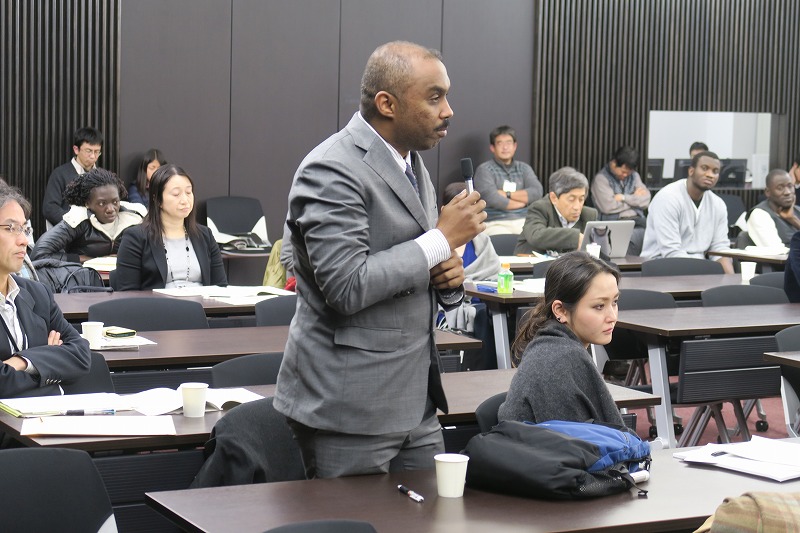
2016年1月24日(日)
- 10:00 – 10:35 Itaru Ohta
- “Liberal Peace” Debates and African Potentials for Materializing Coexistence
- 10:35 – 11:10 Motoji Matsuda (Kyoto University)
- Cultural Creativity for Conflict Resolution and Coexistence: From the Viewpoint of African Potentials
- 11:10 – 11:45 Shinichi Takeuchi (Institute of Developing Economies)
- African Potential as an Analytical Perspective
- 11:45 – 12:20 Motoki Takahasi (Kobe University)
- People as Lithe Agents of Change: African Potential for Development and Coexistence
- 12:20 – 13:50 Lunch
- 13:50 – 14:25 Masayoshi Shigeta (Kyoto University)
- How People Can Achieve the Coexistence through the Sound Use of Resources?
- 14:25 – 15:00 Gen Yamakoshi (Kyoto University)
- Who Owns African Nature? African Perspectives on the Future of Community-Based Conservation
- 15:00 – 15:20 Break
- 15:20 – 16:20
- Comments on these six presentations by six African scholars
- 16:20 – 17:00 General Discussion
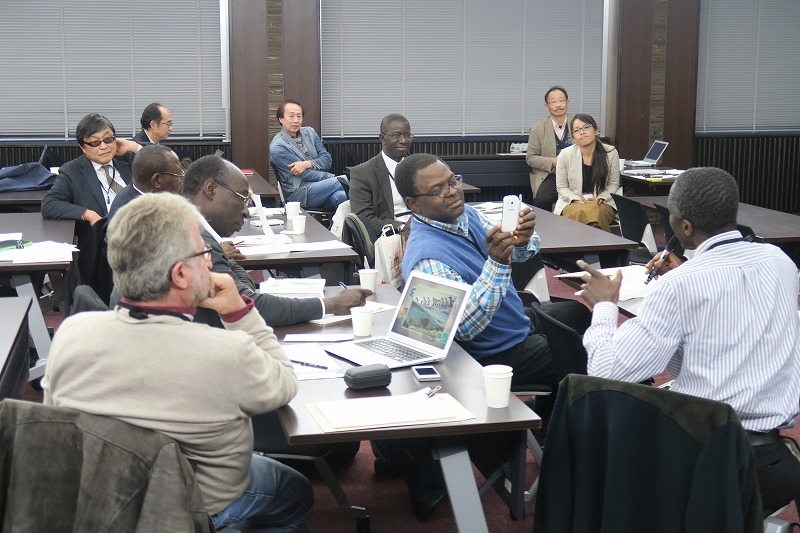
[第5回アフリカの紛争と共生 国際フォーラム(アジスアベバ)](2015年10月31‐11月01日開催)
日 時:2015年10月31日~11月1日
場 所:エチオピア・アジスアベバ、Siyonat Hotel
概要
本プロジェクトでは「アフリカ紛争・共生フォーラム」を毎年1回、アフリカのどこかの都市で開催して、アフリカ諸国の研究者や実務者とともに国際的な議論を深めてきました。わたしたちの研究を、アフリカの現場の状況を深く理解しつつ進めるために、このフォーラムは重要な機能を果たしてきました。初年度の2011年12月にはナイロビで第1回、2012年12月にはハラレで第2回、2013年12月にはジュバで第3回、2014年12月はヤウンデで第4回と継続してきましたが、第5回は2015年10~11月にアジスアベバで開催しました。このフォーラムは、これまでに日本人研究者が構築してきたアジスアベバ大学のエチオピア研究所および社会学・社会人類学科との緊密な協力関係のもとで実現しました。また、このフォーラムは、科研費・基盤研究(A)「アフリカ在来知の生成と共有の場における実践的地域研究」(代表:重田眞義[京都大学])と共催で実施しました。
本フォーラムのタイトルは「Local Knowledge as African Potential」でした。これまでにわたしたちは、紛争解決と共生の実現のために活用される「アフリカ潜在力」を探究してきましたが、今回のフォーラムでは、アフリカの人々の生活を支えている在来の知識や技術、制度など、紛争とは直接的な関連をもたない事象も対象として、「アフリカ潜在力」について考えました。
このフォーラムでは、まず、アジスアベバ大学教授のBerhanu Kassahun教授に、「Local Knowledge as Untapped Potential for Entrenching Development and Conflict Prevention and Resolution: The Ethiopian Experience」と題するキーノート・スピーチをおこなっていただき、エチオピア諸社会に見られる在来知がもつ豊かな可能性について、開発と紛争予防・解決との関連において語っていただきました。そのあと、このフォーラムでは二日間にわたり、11人のアフリカ人研究者と8人の日本人研究者が口頭発表をおこない、「アフリカ潜在力とはなにか」「在来知とはなにか」「伝統とはなにか」といったことについて熱い議論がかわされました。
本フォーラムの一日目は、とくにエチオピアに焦点をあてて「近代的な学校教育の普及と地域社会の葛藤」「土地問題と紛争」「在来知と開発」といった共通テーマについて、複数の口頭発表がありました。二日目には、これまでにこの研究プロジェクトで実施してきた5回の「アフリカの紛争と共生・国際フォーラム」を振り返り、そこで議論されたことは何だったのか、そして、残された課題はなにかについて、集中的な討論をしました。
プログラム
31st October 2015
- 9:00-9:10 OPENING REMARKS
- OHTA Itaru (Center for African Area Studies, Kyoto University)
- 9:10-9:20 WELCOME ADDRESS
- AHMAD Hassan (Institute of Ethiopian Studies, Addis Ababa University)
- 9:20-10:00 KEYNOTE SPEECH
- Local Knowledge as Untapped Potential for Entrenching Development and Conflict Prevention and Resolution: The Ethiopian Experience
KASSAHUN Berhanu (Department of Political Science and International relations, Addis Ababa University) - 10:00-10:15 COFFEE BREAK
- 10:15-11:45 SESSION 1: FRICTION BETWEEN MODERN SCHOOL EDUCATION AND LOCAL COMMUNITIES
Chaired by GEBRE Yntiso (Department of Social Anthropology, Addis Ababa University) - 1) LOCAL KNOWLEDGE AS A MODE OF COEXISTENCE: THE ACCEPTANCE OF MODERN SCHOOL EDUCATION KANEKO Morie (Graduate School of Human and Environmental Studies, Kyoto University) & SHIGETA Masayoshi (Center for African Area Studies, Kyoto University)
- 2) PHYSICALLY EDUCATED TO BE COEXISTED: DYNAMICS OF DISCIPLINE IN THE KENYAN YOUTH IN SPORTS TRAINING SCHOOL
HAGIWARA Takuya (JSPS Research Fellow/Institute for Research in Humanities, Kyoto University) - 3) RESETTLEMENT AND ETHNIC RELATIONS IN JAWI WOREDA, AMHARA REGIONAL STATE
YOHANNES Yitbarek (South Omo Research Center/Arba Minch University)
Commentator: Edward Kirumira (Makerere University) - 11:45-13:00 LUNCH
- 13:00-14:30 SESSION 2: CONFLICTS ON LAND ISSUES I
Chaired by MATSUDA Motoji (Graduate School of Letters, Kyoto University) - 1) PERCEPTIONS, OPPORTUNITIES AND CHALLENHES OF SEDENTARIZATION IN HAMER, SOUTHWESTERN ETHIOPIA
SAMUEL Tafara (Center for African and Oriental Studies, Addis Ababa University) - 2) WAR AND TRADE
SOGA Toru (Faculty of Humanities, Hirosaki University) - 3) URBAN LAND TRANSACTION, ACTORS’ CONFLICT AND SOME APPROACHES TO RESOLUTION
TESHOME Emana (Addis Ababa University)
Commentator: KURIMOTO Eisei (Graduate School of Human Science, Osaka University) - 14:30-14:45 COFFEE BREAK
- 14:45-16:15 SESSION 3: CONFLICTS ON LAND ISSUES II
Chaired by Kennedy Mkutu (United States International University) - 1) FORUM PREFERENCE/SHOPPING FOR DISPUTE SETTLEMENT BY THE RURAL COMMUNITY: THE CASE OF THE TULAMA OROMO OF ETHIOPIA
MELAKU Abera (Addis Ababa University) - 2) LAND REGISTRATION/CERTIFICATION AND THE MAKING OF ‘INTIMATE ENEMIES’: ON POTENTIALS AND CHALLENGES OF LOCAL ELDERS IN DEALING WITH LAND DISPUTES IN WEST ARSII, SOUTHERN ETHIOPIA MAMO Hebo (Department of Social Anthropology, Addis Ababa University)
- 3) LAND RUSH AND THE FRONTIER PROCESS AMONG THE DASANACH OF SOUTHWESTERN ETHIOPIA
SAGAWA Toru (Faculty of Letters, Keio University)
Commentator: Michael Neocosmos (Rhodes University) - 16:15-16:30 COFFEE BREAK
- 16:30-18:00 SESSION 4: LOCAL KNOWLEDGE AND DEVELOPMENT
Chaired by Sam Moyo (African Institute for Agrarian Studies) - 1) TOURISM AND LARGE-SCALE DEVELOPMENT IN SOUTHWESTERN ETHIOPIA:CULTURAL TOURISM BY ARI PEOPLE
NISHIZAKI Nobuko (Fukushima University) - 2) PROPOSAL OF ENGAGED AREA STUDY TO CREATING A NEW CULTURE OF WORK FOOTWEAR IN AFRICA:SHARING LOCAL KNOWLEDGE FOR INTRODUCING JIKA-TABI TO ETHIOPIAN OX-PLOUGH FARMER
TANAKA Toshikazu (Center for African Area Studies, Kyoto University) - 3) THE ENSET PARK ESTABLISHMENT INITIATIVE: AN APPROACH THAT STARTED TO BENEFIT PROPLE AND BIOLOGICAL DIVERSITY
FELEKE Woldeyes (Arba Minch University)
Commentator: Francis Nyamnjoh (University of Cape Town) - 18:00-18:30 GENERAL DISCUSSION
- 9:30 – 9:40 Introduction: Research Project on “African Potentials”
- OHTA Itaru (Center for African Area Studies, Kyoto University)
- 9:40 – 10:20 On all the five African Forums on “African Potentials”
- MATSUDA Motoji (Graduate School of Letters, Kyoto University)
- 10:20 – 10:35 COFFEE BREAK
- 10:35 – 11:05 On the 1st African Forum in Nairobi in 2011
- Kennedy Mkutu (United States International University)
- 11:05 – 11:35 On the 2nd African Forum in Harare in 2012
- Sam Moyo (African Institute for Agrarian Studies)
- 11:35 – 12:05 On the 3rd African Forum in Juba in 2013
- KURIMOTO Eisei (Graduate School of Human Science, Osaka University)
- 12:05-13:35 LUNCH
- 13:35-14:05 On the 4th African Forum in Yaounde in 2014
- Francis Nyamnjoh (University of Cape Town)
- 14:05-14:35 On the 5th African Forum in Addis Ababa in 2015
- GEBRE Yntiso (Department of Social Anthropology, Addis Ababa University)
- 14:35 – 14:50 COFFEE BREAK
- 14:50-15:50 GENERAL DISCUSSION
- Discussant: Bekele Gutema (Department of Philosophy, Addis Ababa University)
Facilitator: OHTA Itaru
1st November 2015
[第4回アフリカの紛争と共生 国際フォーラム(ヤウンデ)](2014年12月04‐05日開催)
日 時:2014年12月4~5日
場 所:カメルーン・ヤウンデ、Tou’Ngou Hotel
概要
本プロジェクトでは「アフリカ紛争・共生フォーラム」を毎年1回、アフリカで開き、アフリカ諸国の研究者や実務者とともに国際的な議論を深めています。初年度の2011年12月にはナイロビで第1回、2012年12月にはハラレで第2回、2013年12月にはジュバで第3回と継続してきましたが、第4回は西に場所を移して、2014年12月にヤウンデで開催しました。このフォーラムは、これまでに日本人研究者が構築してきたヤウンデ第1大学人類学科との緊密な協力関係のもとで実現しました。
ヤウンデ・フォーラムでは、中部・西部アフリカを対象として研究を続けてきたアフリカ人9人(基調講演をふくむ)と日本人6人の口頭発表がありました。また、いままでの3回の「紛争・共生フォーラム」において継続的に重要な役割を果たしてきたアフリカ人研究者4人と、この研究プロジェクトの主要メンバーである日本人6人もコメンテータとして参加しました。そして、これまでに開催した3回のフォーラムの成果を踏まえつつ、紛争解決と共生の実現のために活用できる「アフリカの潜在力」とは何かについて、多様な視点から活発な意見交換がおこなわれました。
フォーラムでは、最初に研究代表者の太田至が趣旨説明をおこなったあと、マケレレ大学のエドワード・チルミラさんから、これまでに開催した3回のアフリカ・フォーラムおよび「アフリカの潜在力」研究プロジェクト全体に対して、批判的なコメントをいただきました。チルミラさんは、アフリカの潜在力という考え方に対して、それをロマン化、技術化(コンパートメント化)、あるいは本質化することなく、批判的な検討をくわえながらこの概念を鍛え、実践につなげてゆくことの重要性を論じました。
次には、ケープタウン大学のフランシス・ニャムンジョさんに「Incompleteness: Frontier Africa and the Currency of Conviviality」と題するキーノート・スピーチをしていただきました。ニャムンジョさんはカメルーン出身の人類学者で、カメルーンの首長制の近代的な展開や都市における人々の移動性、南アやボツワナにおける人種や国籍の問題など、ひろいテーマに関して縦横に議論を展開しており、アフリカの中堅世代を代表する知性の一人です。このキーノートでは、彼の議論の中心概念のひとつである「conviviality」について、エイモス・チュツオーラの『やし酒飲み』の登場人物が常に転成を繰り返すことに見られる流動性や可変性、アフリカ人のフロンティア的な存在のあり方との関連において語り、「convivialityとは、存在が不完全であるという現実を認識し、それに対応した生き方をすることにほかならない」と結論づけました。彼の「conviviality」の概念は「アフリカの潜在力」を考えるためのおおきな理論的支柱となると思います。
今回のヤウンデ・フォーラムでも、いままでのフォーラムと同じように、参加する人びとには、まえもって以下の五つの質問を送りました。そして発表者には、自分の調査地での経験をもとにしながら、この質問に答えるかたちで2000~3000語のメモを用意してもらい、それをもとにして焦点の定まった議論をすることを試みました。
- 紛争の解決や社会的な和解と癒しのために有効に利用することができる「アフリカの潜在力」とは何か。「アフリカの潜在力」とはあいまいで多面的、かつ問題のある概念でありうるし、保守的、リベラル、あるいはラディカルなイデオロギーを内包しうる。
- 「アフリカの潜在力」は、紛争解決の過程において、どのように機能しうるか。
- 紛争解決と正義の実現のためには、グローバルで普遍的なシステムが利用されることが一般的であるが、「アフリカの潜在力」は、そうしたシステムとどのように接合できるのか。ローカルな正義はしばしば「政治的に正しくない劣悪な習慣」と表現されることがあるが、「アフリカの潜在力」は、人権を擁護しつつ、ローカルに通用する正義と普遍的な正義との両方を、どのようにして同時に達成しうるのか。
- 「アフリカの潜在力」には有害な慣行がふくまれることもある。こうした負の側面が紛争を拡大してしまうことはないのか、その場合、それはどのように対処しうるのか。
- 中部・西部アフリカの紛争パターンに、アフリカのほかの地域とは異なった独自のものがあるとしたら、それはどのようなものか。
- What are African Potentials that can be utilized for conflict resolution, reconciliation and social healing? (the concept of African Potentials could be ambiguous, multifaceted and problematic including conservative/liberal/radical ideologies.)
- How can they work in a conflict resolution process?
- How can African Potentials be articulated with global/universal system of justice and conflict resolution and how could they satisfy both of local and universal justice and protect human rights at once in addressing “bad, politically incorrect customs”?
- African Potentials may include negative aspects. How those negative aspects cause situation of conflict worsen and how can they be dealt with?
- What are unique conflict patterns, if any, in West and Central African contexts that are different from those in other African regions?
キーノート・スピーチのあと、フォーラムでは5つのパネルにわかれて合計14件の口頭発表がありました。プログラムは以下のとおりです。
口頭発表のなかでは多くの具体的な論点との関連において、紛争解決と共生の問題が議論されました。たとえば、多民族状況や先住性、家族や出自集団の役割、葬送儀礼や呪術、首長制、紛争後社会における国家と社会、若者たちが果たす役割などです。
以下に掲載するのは、こうした口頭発表と議論から導き出された論点をまとめたものです。フォーラムの最後の総合討論では、この論点を参照しながら議論をかわしました。
議論された主要な課題
- Are TCRMs (“Traditional Conflict Resolution Mechanisms”) useful? If so, how and where? Traditional leaders, marriages, gift exchange, family, rituals, and even witchcraft. What can be a common thread?
- Cameroon seems to be peaceful, relatively speaking, both at local and national levels. How conflicts are contained without developing into more violent ones (Farmers – hunter-gatherers – (migrant traders) – rival ethnic groups).
Also, farmer–herder relationship in Niger, witchcraft accusations in Nigeria, Muslim–non-Muslim relationships. - The Regional context: Central & West Africa (Cameroon, the two Congos, Nigeria, Niger, Sierra Leone, Burkina Faso). Is there a regional context?
Comparison with other regions, East, North-East and the Southern Africa. Common and different features. - Angry and hungry youths and conflict: their agency. Vanguard or Vandals? (not adequately argued in the past African fora)
Street gangs, “vagabonds,” village vigilantes, militias, and soldiers. Their social inclusion/exclusion. Seeking for ranks and titles, … - Historical perspective, or historicizing conflicts, especially from a perspective of the globalized economic system. 25 years have passed since 1989, the turning point of world history. Or, more than 3 decades since the time of SAPs. Neo-liberalism and globalization in Africa already have their own history.
- Structure and agency
Different structures and agencies, in relation to conflicts, need to be identified and classified.
Traditional/modern, rural/urban, national/transnational.
Is co-existence/cohabitation possible among social groups whose relations are asymmetrical and unequal? (“Can masters and slaves co-exist?”) - The role of diaspora. A new topic brought to our attention during this forum. Distant nationalism, remittance and investment, circular movements … A part and parcel of “African Potentials”?
- Conviviality and Incompleteness: A new understanding of “African Potentials”?
Is it a liberation/emancipation from the obsession, imposed by West, of completeness and rationality? Is there a danger that it would be considered a new version of neopatriomonial state model? That is, “Africa works,” irrespective of, or to be exact, because of a variety of incompleteness.
プログラム
The Forth Forum on “Comprehensive Area Studies on Coexistence and Conflict Resolution Realizing ‘African Potentials’”
December 5 (Fri.)
- 9:30 – 9:40 Opening Remarks
- Prof. Itaru Ohta (The Center for African Area Studies, Kyoto University, Japan)
- 9:40 – 9:55 Welcome Address
- Prof. Mbonji Edjenguèlè (Department of Anthropology, University of Yaoundé I, Cameroon)
- 9:55 – 10:05 Special Remarks on ‘African Potentials’ Project
- Prof. Edward K. Kirumira (College of Humanities and Social Sciences, Makerere University, Uganda)
- 10:05 – 10:10 Introduction of the Keynote Speaker
- Prof. Motoji Matsuda (Graduate School of Letters, Kyoto University, Japan)
- 10:10 – 11:00 Keynote Speech
- Prof. Francis B. Nyamnjoh (Department of Social Anthropology, University of Cape Town, South Africa) Incompleteness: Frontier Africa and the Currency of Conviviality
- 11:00 – 11:10 Coffee/tea break
- 11:10 – 12:45 Panel 1: Conflict and Coexistence in Multi-Ethnic Societies
Chair: Prof. Sam Moyo (The African Institute for Agrarian Studies, Zimbabwe) - 1)Prof. Godefroy Ngima Mawoung (University of Ngaoundéré, Cameroon)
- Bantu Bakola/Bagyelli: A Secular Permanent Conflictual Cohabitation
- 2)Dr. Takanori Oishi (The Research Institute for Humanity and Nature, Japan)
- Land Conflict in Multi-Ethnic Context: Trans-Ethnic Negotiation and Cultural Transmissions in the Expansion Process of Cocoa Farming in Southeastern Cameroon
- 3)Prof. Shuichi Oyama (The Center for African Area Studies, Kyoto University, Japan)
- Importance of Meeting and Mediators Concerned with Local Conflicts of Nigerien Sahel, West Africa: From Viewpoints of Neutralization, Gratitude and Giving-Receiving Customs
- *Comments on Session 1
- Prof. Gebre Yntiso (College of Social Science, Addis Ababa University, Ethiopia)
Prof. Daiji Kimura (The Center for African Area Studies, Kyoto University, Japan) - 12:45 – 14:00 Lunch break
- 14:00 – 15:50 Panel 2: Conflict and Resolution from Micro Perspectives
- Chair: Prof. Kennedy Mkutu (United States International University, Kenya)
- 1)Prof. Honoré Mimche & Dr. Blaise Nguendo Yongsi (Institut de Formation et de Recherche Démographique, Cameroon)
- Family as Space of Conflicts Resolution in African Traditional Societies
- 2)Prof. Luc Tamba Mebenga (Department of Anthropology, University of Yaoundé I, Cameroon)
- Seeking Peace through the Bëti Funeral Rites in South Cameroon
- 3)Prof. Hidetoshi Kondo (College of Foreign Studies, Kansai Gaidai University, Japan)
- Magical Turn of Relations: Rethinking Conflicting Relationships in the Study of African Witchcrafts
- *Comments on Session 2
- Prof. Edward K. Kirumira
Prof. Itaru Ohta - 15:50 – 16:10 Coffee/tea break
- 16:10 – 17:30 Panel 3: Violent and Non-Violent Conflicts in Congo and Cameroon
- Chair: Prof. Shuhei Shimada (Graduate School of Global Studies, Tokyo University for Foreign Studies, Japan)
- 1)Prof. Rémy Bazenguissa-Ganga (École des Hautes Études en Sciences Sociales, France)
- Democratization by Taking up Arms: Containing Violence in the Two Congos
- 2)Prof. Antoine Socpa (Department of Anthropology, University of Yaoundé I, Cameroon)
- “Autochthons” and “Allochtons” divide, Ethnic Stereotypes and Social Conflicts in Cameroon
- *Comments on Session 3
- Prof. Sam Moyo
Prof. Eisei Kurimoto (Graduate School of Human Sciences, Osaka University, Japan)
December 6 (Sat.)
- 10:00 – 11:50 Panel 4: “Traditional” Authorities as Potential
- Chair: Prof. Edward K. Kirumira
- 1) Prof. Hisashi Matsumoto (College of Education and Human Sciences, Yokohama National University, Japan)
- Chieftaincy as an African Potential in Contemporary Nigeria: Reimagining Home among the Igbo Migrants from Southeastern Nigeria
- 2) Dr. Takao Shimizu (The Research Institute for Humanity and Nature, Japan)
- Marginalized Muslim and Reproduction of Muslim in Burkina Faso
- 3) Dr. Ange Bergson Lendja (Université Paris 8, France) & Prof. Misa Hirano-Nomoto (The Center for African Area Studies, Kyoto University, Japan)
- The Dynamics of Conflicts Resolution in Bamileke Chiefdoms in Cameroon: The State, Traditional Authority, and Supernatural Power
- *Comments on Session 4
- Prof. Kennedy Mkutu
Prof. Motoji Matsuda - 11:50 – 13:30 Lunch break
- 13:30 – 15:20 Panel 5: Struggles of Youth for Survival in Conflict and Post-Conflict Societies
- Chair: Prof. Gebre Yntiso
- 1) Dr. Hideyuki Okano (Osaka School of International Public Policy, Osaka University, Japan)
- Public Authorization of an Informal Sector Activity: Institutionalization of Motorbike Taxi in Post-Conflict Sierra Leone
- 2) Dr. Daniel E. Agbiboa (Department of International Development, University of Oxford, UK)
- Turning the Tide against the Boko Haram Insurgency: An Increasing Role for Local Youth
- 3) Dr. Cyril Obi (The Social Science Research Council, USA) & Dr. Godwin Onuoha (Princeton Institute for International and Regional Studies, Princeton University, USA)
- Youth Conversations in a Post-Amnesty Niger Delta: An Analysis of the Potential for Sustainable Peacebuilding in Nigeria’s Oil-Rich Region
- *Comments on Session 5
- Prof. Shuhei Shimada
Prof. Yoichi Mine (Graduate School of Global Studies, Doshisha University, Japan) - 15:20 – 15:40 Coffee/tea break
- 15:40 – 16:50 General Discussions
- Chair: Prof. Eisei Kurimoto
- 16:50 – 17:00 Concluding Remarks
- Prof. Itaru Ohta
[第3回アフリカの紛争と共生 国際フォーラム(ジュバ)](2013年12月06‐08日開催)
日 時:2013年12月6~8日
場 所:ジュバ、Juba Grand Hotel
概要
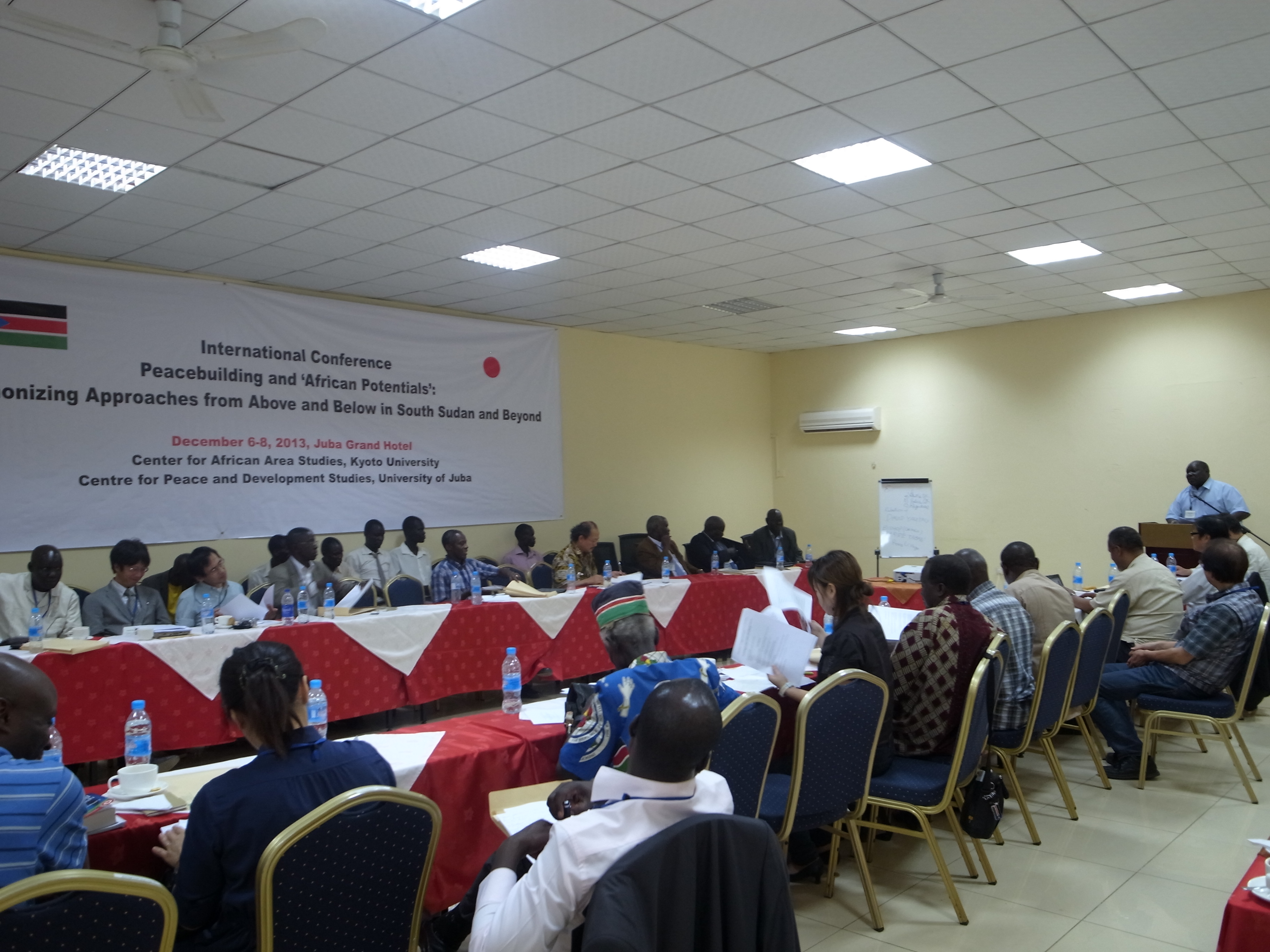
第3回アフリカの紛争と共生 国際フォーラムは、2013年12月6日から南スーダン共和国の首都ジュバで、京都大学アフリカ地域研究資料センターとジュバ大学平和開発研究センター(Centre for Peace and Development Studies)の共催で開催された。会場はジュバグランドホテルであった。
第3回国際フォーラムのタイトルは「平和構築と『アフリカの潜在力』:南スーダンと周辺地域における上からと下からのアプローチの調和」(”Peacebuilding and ‘African Potentials’: Harmonizing Approaches from Above and Below in South Sudan and Beyond”)であった。第1回と第2回の国際フォーラムは、それぞれ東アフリカと南部アフリカという、複数の国からなるアフリカ大陸のひとつの地域を対象とし、紛争解決と共生、さらには「アフリカの潜在力」をめぐる問題系の地域的特性を議論した。それに対して今回の国際フォーラムは、南スーダンというひとつの国に焦点をあてたものであった。
とくに南スーダンをフォーラムの対象に選らんだことには三つの理由がある。第一に、2005年まで22年間にわたる内戦を経験し、内戦が終結した2005年以降、そして住民投票をへて2011年7月に南部スーダンが南スーダン共和国として独立した以降も、さまざまな武力紛争が継続しており、アフリカの紛争を考えるうえでは格好の対象と考えられることがある。第二に、武力紛争が継続する一方で、内戦中から多数の和解と平和構築の試みが行われてきたことが挙げられる。南スーダン人自身のイニシアティヴに基づき、主としてキリスト教会系の市民組織が支援・仲介したこうした試みは「人びと同士の平和」(People-to-People Peace)や「草の根平和構築」(Grassroots Peacebuilding)と呼ばれている。本フォーラムでは、こうした試みを「下からの平和」(Peace from Below)と呼ぶ。第三に、内戦が終結した2005年以降、国連、国際社会、そして南部スーダン政府/南スーダン共和国政府によって、戦後復興と開発の枠組みにのなかで、平和の定着を目指した、本フォーラムで「上からの平和」と呼ぶ、さまざまなプロジェクトが開始されたことがある。つまり、南スーダンは、平和構築の巨大な実験場なのであり、その実験には上から下まで、外部と内部、さまざまな主体がかかわっている。その意味で、たんに紛争だけでなく、共存や和解のあり方、さらには「アフリカの潜在力」を考えるうえでも、南スーダンはきわめて重要な位置を占めているといえる。
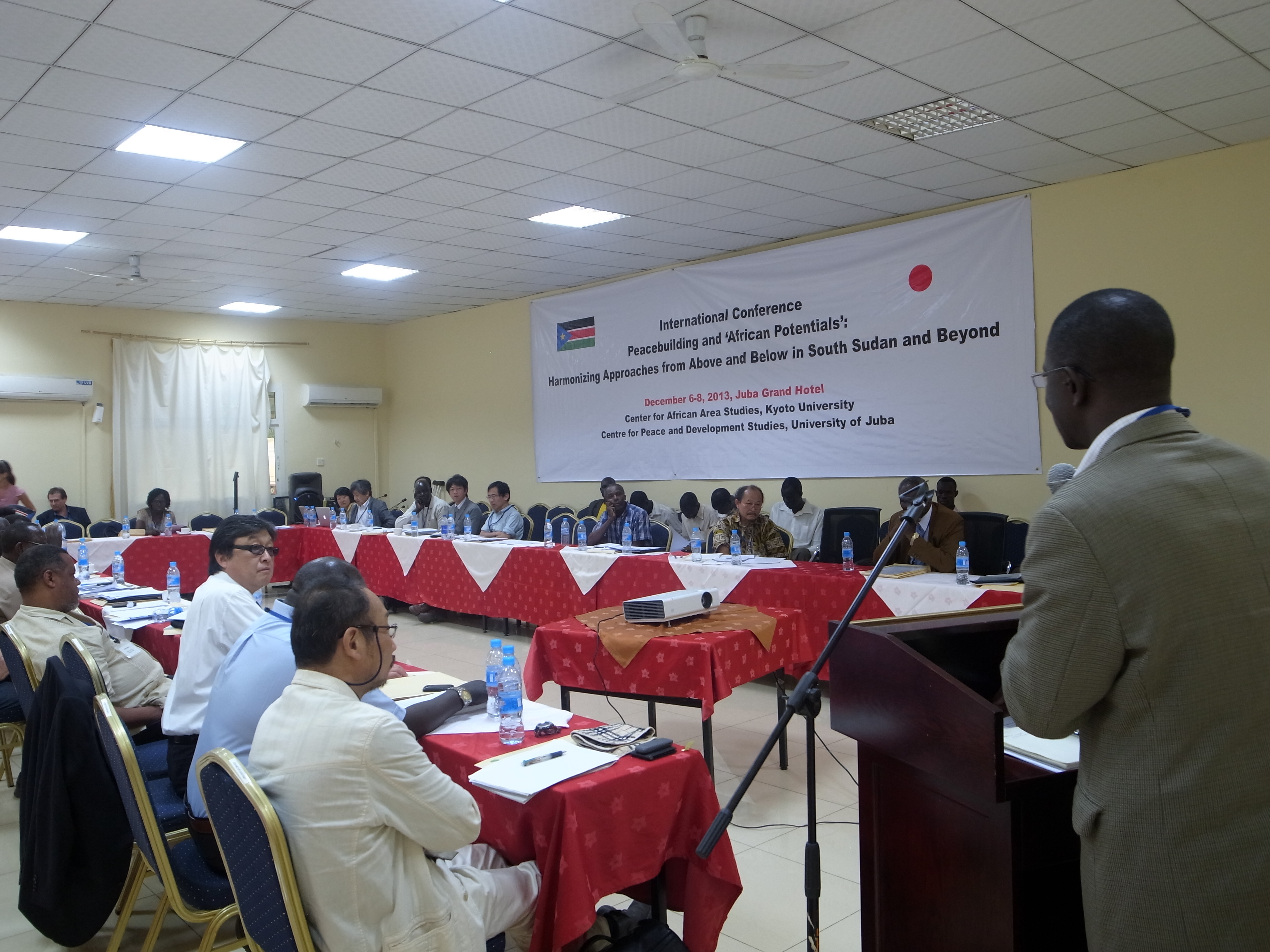
私たちの基本的な認識は、現時点でも進行している武力紛争と国民が分断されたままの状況を考えると、この巨大な実験は成功しつつあるとは言い難いこと、そして、根本的な問題は、「下からの平和」と「上からの平和」のあいだにギャップが存在しており、二つのアプローチのシナジー、接合、あるいは調和を模索する必要があるということであった。
以上に基づき、本国際セミナーでは、南スーダンにおける紛争と平和構築にかかわってきた、考えられるすべての関係者を招へいし、それぞれの立場から発表してもらうことにした。具体的には、関係者とは研究者、「下からの平和」の実践者、南スーダン政府と議会の責任者、国連と国際NGOの専門家である。また、南スーダンの状況と直接関連しているスーダンとウガンダ北部を研究対象としている研究者も発表者に加わってもらった。
本国際フォーラムでは、基調報告に続いて4つの分科会で13件の発表が行われた。3日間の発表と討論で、「上からと下からのアプローチの調和」への道筋が明確になったわけではない。むしろ、あらためてあきらかになったのは、両者のあいだのギャップの大きさかもしれない。今回のフォーラムの目的のひとつは、紛争と平和構築の研究者と平和構築の実践者と政策決定者のあいだの対話の場を提供し、しかもたんなる情報交換ではなく、自己の営為を相対化して自省的・自己批判的に捉える視点を獲得することであった。3日間という期間は、こうした深い対話を実現するには短すぎたのかもしれない。また、主催者側の意図が発表者に十分には伝わっていなかったという問題もあった。しかし、今回のフォーラムの成果を踏まえて、思考と対話を継続していく必要があることはたしかである。
フォーラムのハイライトのひとつであったのは、長年コミュニティレベルでの草の根平和構築を実践してきた2名のキリスト教会関係者による、きわめて生き生きとした、笑いを引き起こすとともに共感を呼んだ発表であった。人びとをひきつけるこうした「身体化された雄弁術」は、南スーダン人びとが共有している伝統であることはあきらかであり、「アフリカの潜在力」の例証である。さらに言えば、困難な状況のなかで粘り強く継続されてきた平和構築の試み自体に、「アフリカの潜在力」を見いだすことができるだろう。
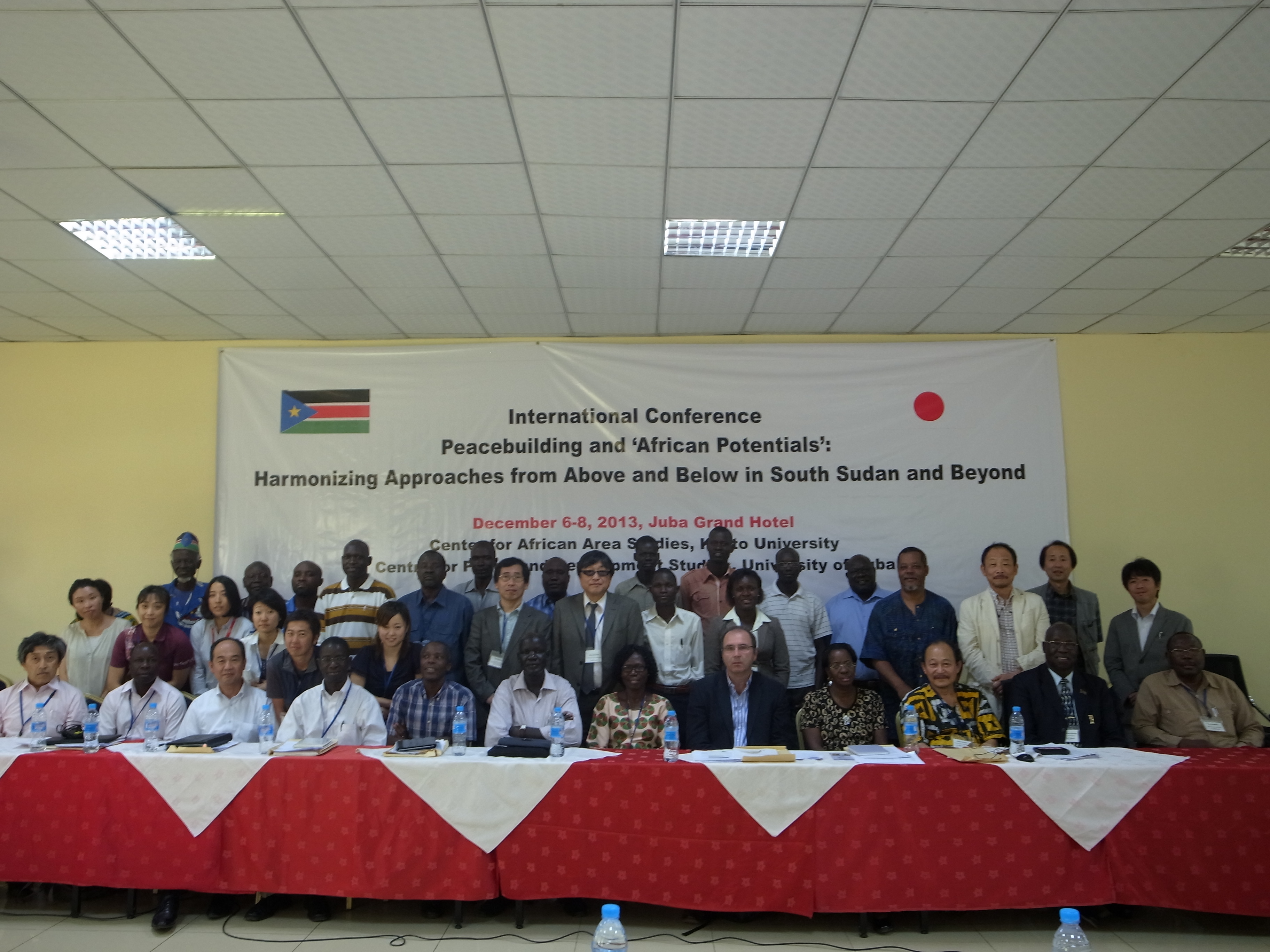
第3回国際フォーラムが終了したちょうど1週間後にジュバで政府軍SPLA同士の衝突が発生し、動乱はまたたくまに全国各地に飛び火し、内戦と呼んでさしつかえない状態に展開した。そのなかで、内戦は「民族紛争」の側面を色濃く帯びるようになった。幸い、フォーラムに参加した南スーダン人のなかで犠牲者はでていないが、彼/彼女たちの生活や運命もおおきく転換することになった。 2013年12月以降の動乱は、長年続けられてきた平和構築の試みが成功したとは言えないことを示唆している。南スーダンにおける「潜在力」とは、平和を志向するものではなく、武力紛争へと向かう傾向を意味しているのではないかとさえ思えてしまう。2014年1月23日に停戦合意が成立したが前途は多難である。新生国家南スーダンは、早くもおおきな危機を迎えている。紛争が発生した当初は、国際フォーラムの開催および成果のとりまとめがむなしく思えていたが、現在は将来のためにも成果の英語出版が必要であると考えている(2014年3月6日、栗本英世)。
プログラム
December 6 (Fri.)
- 14:00 – 14:20 OPENING REMARKS
- Dr. Sirisio Oromo (Director, Centre for Peace and Development Studies, University of Juba) & Prof. Itaru Ohta (Center for African Area Studies, Kyoto University)
- 14:20 – 14:40 WELCOME ADDRESSES (chaired by Dr. Sirisio Oromo)
- Prof. Aggrey L. Abate (Vice Chancellor, University of Juba)
- 14:40 – 14:45 INTRODUCTION OF THE KEYNOTE SPEAKER
- Prof. Eisei Kurimoto (Graduate School of Human Sciences, Osaka University)
- 14:45 – 15:30 KEYNOTE SPEECH
- Dr. Peter Adwok Nyaba (Former Minister of Higher Education, Republic of South Sudan /
Independent scholar)
“The War of Liberation Is Over; South Sudan Is Independent; Why Are the People Still Dying?” - 15:30 – 15:50 DISCUSSIONS (chaired by Prof. Eisei Kurimoto)
- 15:50 – 16:10 COFFEE/TEA BREAK
- 16:10 – 18:10 PANEL 1: INTERNAL AND EXTERNAL DYNAMICS OF ARMED CONFLICTS
- Chair: Mr. Philip Ohuyoro (Lecturer, College of Social & Economic Studies, University of Juba)
- 1) Prof. Eisei Kurimoto
- “Armed Conflicts in South Sudan since 2005: Old and New, an Attempt of Classification and Contextualization”
- 2) Prof. Samson Wassara (College of Social & Economic Studies, University of Juba)
- “Indigenous Potentials for Dispute Settlement and Reconciliation Waning in South Sudan: Consequences of Armed Conflicts”
- 3) Mr. Simon Monoja (College of Social & Economic Studies, University of Juba)
- “Ethnicity and Conflict: The Case of Jonglei State”
- Discussant: Prof. Edward K. Kirumira (College of Humanities and Social Sciences, Makerere University)
- 18:30 – 20:00 RECEPTION AT AFRICAN HUT, JUBA GRAND HOTEL
December 7 (Sat.)
- 09:00 – 10:30 PANEL 2: DESIGNING PEACEBUILDING AND RECONCILIATION
- Chair: Dr. Sirisio Oromo
- 1) Ms. Nguyen Thi Ngoc Van (Head of the South Sudan Recovery Fund Secretariat, UNDP) & Dr. Mayumi Yamada (Recovery, Reintegration, Peace Building (RRP) Officer, UN Resident Coordinator’s Office)
- “A Human Rights-Based Approach (HRBA) to Sustainable Peace and Development in South Sudan”
- 2) Hon. David Okwier Akway (Chair, The Peace and Reconciliation Committee, South Sudanese Legislative Assembly)
- 3) Hon. Chuol Rambang (Chair, The Peace and Reconciliation Commission, Government of the Republic of South Sudan)
- Discussant: Prof. Yoichi Mine (Graduate School of Global Studies, Doshisha University)
- 10:30 – 10:50 COFFEE/TEA BREAK
- 10:50 – 12:50 PANEL 3: VIEWS FROM BELOW: LEARNING FROM CASE STUDIES
- Chair: Prof. Samson Wassara
- 1) Mr. Isao Murahashi (Ph.D. Candidate, Graduate School of Human Sciences, Osaka University / JSPS Postdoctoral Research Fellow)
- “Inter-ethnic and inter-communal conflicts after CPA: The root cause of conflicts and the possibility of coexistence in Eastern Equatoria State”
- 2) Ms. Eri Hashimoto (Ph.D. Candidate, Graduate School of Social Science, Hitotsubashi University)
- “Searching for ‘African Potentials’ in the ‘Modern’ Conflicts of South Sudan: An Aspect of Armed Youth and the Prophet in Jonglei State”
- Discussant: Prof. Motoji Matsuda (Department of Sociology, Graduate School of Letters, Kyoto University)
- 12:50 – 14:30 LUNCH BREAK
- 14:30 – 17:20 PANEL 4: CHALLENGES OF GRASSROOTS PEACEBUILDING AND RECONCILIATION
- Chair: Prof. Eisei Kurimoto
- 1) Mr. Michael Arensen (The PACT-South Sudan)
- “Implementing Peacebuilding in South Sudan”
- 2) Ms. Gladys Mananyu (The South Sudan Council of Churches (SSCC))
- “Peoples Voices, Desires for Peace That Starts within Tender Hearts”
- 3) Fr. Archangelo Lokoro (Vicar-General, Catholic Diocese of Torit (DOT))
- “Be a Good Neighbour Yourself”
- 4) Rev. James Ninrew (Nuer Peace Council)
- Discussant: Prof. Sam Moyo (The Executive Director, The African Institute for Agrarian Studies (AIAS))
December 8 (Sun.)
- 09:00 – 11:00 PANEL 5: VIEWS ACROSS NATIONAL BORDERS
- Chair: Mr. Simon Monoja
- 1) Dr. Itsuhiro Hazama (Assistant Professor, Graduate School of International Health Development, Nagasaki University)
- “Peace and Bodily Expression from Below: Violence through Disarmament in Karamoja, Northern Uganda”
- 2) Prof. Tanga Odoi (College of Humanities and Social Sciences, Makerere University)
- 3) Dr. Christine Mbabazi (College of Humanities and Social Sciences, Makerere University)
- “Potential and Limitations of Traditional Rituals in Peacebuilding”
- 4) Prof. Akira Okazaki (Graduate School of Social Science, Hitotsubashi University)
- “Peacebuilding from the ‘Bottom’: African Traditional Wrestling Matches as Potentials for Conflict Prevention and Reconciliation”
- Discussant: Prof. Kennedy Mkutu (International Relations and Peace Studies, United States International University)
- 11:00 – 11:30 COFFEE/TEA BREAK
- 11:30 – 13:00 GENERAL DISCUSSIONS
- Chairs: Prof. Eisei Kurimoto & Prof. Motoji Matsuda (Department of Sociology, Graduate School of Letters, Kyoto University)
- 13:00 – 13:10 CONCLUDING REMARKS (by Prof. Itaru Ohta)
- 13:20 – 14:50 FAREWELL LUNCH
[第1回国際シンポジウム]「African Potentials 2013: International Symposium on Conflict Resolution and Coexistence」(2013年10月05-06日開催)
日 時:2013年10月5日(土)& 6日(日)
場 所:京都大学稲盛財団記念館3階大会議室
議論の概要
この国際シンポジウムは、5年間の予定で実施している本研究プログラムの3年目に、これまでの成果をもちよって議論を深め、「アフリカの潜在力」に関する今後の研究方針を検討することを目的として、10人の外国人研究者を招へいして開催した。全体を4つのセッションにわけて、それぞれ4つずつ、合計16件の口頭発表があった。また、同時に開催したポスター・セッションには、日本人の若手研究者を主体として13件の発表があった。
キーノート・スピーチには、アフリカ史研究を牽引してきた歴史学者であるFrederick Cooper氏(ニューヨーク大学)を招へいして、”Decolonization and the Quest for Social Justice” と題する講演をしていただいた。
以下には、シンポジウムの総合討論のために栗本英世氏がまとめてくれたメモにそって、議論の要点を報告する。
(1)このシンポジウムでは多様な紛争、もめ事があつかわれた
- 内戦:シエラレオネ、ウガンダ、モザンビーク、南アフリカ
- 武装闘争:北部ケニアと南スーダンの牧畜社会、カメルーン北部の地域社会
- 武器をともなわない争い:タンザニア・モシの協同組合、タンザニア・キロンベロ渓谷における自然資源をめぐる争い、タンザニアに導入された「緑の革命」、エチオピアのアルシ・オロモ社会、エチオピアにおける自然保護をめぐるもめ事、ニジェールにおける農民と牧民の争い
武器をともなわない争いは、かならずしも非暴力的なわけではない。それどころか人びとは、しばしばみずからの意志に反して攻撃的にふるまし、その結果、一部の人びとは避難を余儀なくされている。また、それまでのように生計を立てていくことが困難な状況におかれる。 - 南部アフリカ:アパルトヘイト、ポスト・アパルトヘイト期における暴力的な状況をわれわれはどのように位置づけるべきか。
(2) 紛争は、どのような主体のあいだにおこっているのか。
- 国家(政府)と武装グループ
- 国家(政府)とローカルな共同体や民族集団
- ローカルな共同体や民族集団同士のあいだ:カメルーンにおけるバミレケとほかの民族集団、南アフリカにおけるソトとツワナ、エチオピアにおけるマンジョとカファ、牧民と農民、移住民と地元民など
- 市民社会、共同体、民族集団の内部:エチオピアのアルシ・オロモ、ケニアのイゲンベ社会、カメルーンのバミレケ社会
- 国際的な組織や運動(環境保護、開発、人道援助、人権保護)とローカルな共同体とのあいだ
- 国際的な組織や運動とアフリカ国家(政府)
- 階級間のあらそい
- 生者と死者のあいだのもめ事
しかしながら、こうした主体間に明確な境界線を想定すると、しばしば現実を誤認することになる。関係は重層的であるし、また、一見したところでは非常にローカルな紛争にも、地域や国家、国際関係がつよく影響している場合もある。発表者のひとりのMamo Hebo Wabe氏は、エチオピアのオロモ社会には、“A human being is a human being because of other human beings.” ということわざがあると語っていたが、逆にいえば、他者が「人間」ではないと見なされたときに、激しい暴力をともなう紛争がおきることになる。この状況は、いつ、どのように発生するのだろうか。
(3) 「アフリカの潜在力」をめぐる諸問題
- 「潜在力」とは誰のものか、それを同定し活用するのは誰なのか。すくなくともそれは、外部の研究者や実務家によって発見されるものにとどまるべきではない。
- 経済発展と紛争解決、そして共生の実現は両立しうるのか。すくなくとも開発=発展計画は、新たな紛争・もめ事を引き起こすものであってはならない。
- 自然資源をめぐっていろいろな対立がおこる。こうした競合がおこることは、ある意味で不可避であるし、また状況は重層的で複雑である。
- 社会的・経済的な「正義」「不公平」(Justice/Injustice)の問題は、十分に議論されてこなかった。また、Justiceとは何かをめぐって、多様な主体間にはおおきなギャップがある。
(4) 「アフリカの潜在力」という概念を明確にするための指針
- これまでの研究では、単純な二元論(近代/伝統、普遍的/特殊的、西欧/アフリカ)にもとづく議論が多かったが、それは「アフリカの潜在力」を考えるためには無用のものである。
- われわれが現地で遭遇する事件は、想像以上に複雑で錯綜しており、動的なものである。「伝統」「慣習的」「部族的」「エスニック」「共同体」といった概念は、所与のものとみなすことはできない。こうした概念で指示されるものは、実際には可変的・状況依存的であって、つねに競合や交渉にさらされている。それゆえに ”positioning”といった概念が有効になる。
- 「国家」「政府」といった概念もまた、構造や機能が普遍的なものとみなされているが、実際には、地域によって異なる働き方をする。・
- 紛争にかかわる主体は重層的な関係をもち、相互に浸透・混合し合う。状況によって、異なる”positioning”をとる。主体は、ある種の社会的・政治的・文化的な集団や組織に属しているとみずから主張するが、しかし、その集団や組織自体が可変的なものである。
- このように、動的で柔軟性をもち、可変的であるもの、つねに競合と交渉にさらされているものとして「アフリカの潜在力」を考えるべきだろう。
- 同時にまた、そうした性質をもつがゆえに「アフリカの潜在力」は権力をもつものによって操作され、悪用される可能性もある。こうした側面の研究も必要である。
プログラムとプロシーディング
>> 最新情報:プログラム/ポスター発表 PDF (2013.10.02 Up)
October 5 (Saturday), 2013
- 9:20 – 9:30 Itaru Ohta (Kyoto University) Opening Address
9:30 – 10:15 Frederick Cooper (New York University)
Keynote Speech: Decolonization and the Quest for Social Justice in Africa
10:15 – 10:45 Questions and Answers with Professor Cooper
10:45 – 11:00 Break - 11:00 – 12:00 Core Time of “Poster Presentations” (Middle-sized Conference Room)
12:00 – 13:30 Lunch
13:30 – 16:00 Session 1 Revisiting Transitional Justice
16:00 – 16:20 Break
16:20 – 18:50 Session 2 Beyond Conflicts in Africa: How to Understand Nexus
between Social Relations, Resource Scarcity and Economic Development
October 6 (Sunday), 2013
- 9:30 – 12:00 Session 3 Whose Potential Can Contribute toward the Process of Conflict Resolution over Natural and Livelihood Resources?
12:00 – 14:00 Lunch
14:00 – 16:30 Session 4 Local Wisdoms and the Globalized Justice in a Process of Conflict Resolution
16:30 – 16:50 Break
16:50 – 18:00 General Discussion
セッション 詳細
October 5 (Saturday), 2013
◎Session 1. Revisiting Transitional Justice
- Chaired by
Shinichi TAKEUCHI (Institute of Developing Economies, Japan External Trade Organization) - 13:30-14:00 John CAULKER (Fambul Tok International)
- The Role of Community Owned and Led Reconciliation Processes in Post War Sierra Leone
- 14:00-14:30 Zenzile KHOISAN (KhoiSan First Nation Status / Eerste Nasie Nuus[First Nation News])
- Transitional Justice under Pressure: South Africa’s Challenge
- 14:30-15:00 Toshihiro ABE (Department of Literature, Otani University)
- Is Transitional Justice a Potential Failure? Understanding Transitional Justice Based on Its Uniqueness
- 15:00-15:30 Tamara ENOMOTO (Graduate School of Arts and Sciences,
University of Tokyo) - Governing the Vulnerable Self at Home and Abroad: Peace and Justice in Northern Uganda and “KONY 2012”
- 15:30-15:40 Comment
Kyoko CROSS (Graduate School of Law, Kobe University) - 15:40-16:00 General Discussion
◎Session 2. Beyond Conflicts in Africa: How to Understand Nexus between Social Relations, Resource Scarcity and Economic Development
- Chaired by
Motoki TAKAHASHI (Graduate School of International Cooperation Studies, Kobe University) - 16:20-16:50 Othieno NYANJOM (Kenya Institute for Public Policy Research and Analysis)
- Understanding Pastoralism in Northern Kenya: The Imperative for Socio-Economic Transformation
- 16:50-17:20 David G. MHANDO (Sokoine University of Agriculture) , Juichi ITANI (Graduate School of Asian and African Area Studies, Kyoto University)
- Social Conflicts as a Motive for Desirable Change: The Case of Farmer’s Primary Societies in Moshi, Tanzania
- 17:20-17:50 Yuko NAKANO (Faculty of Humanities and Social Sciences, University of Tsukuba), Takuji TSUSAKA (International Crops Research Institute for the Semi-Arid Tropics), Shimpei TOKUDA (Japan International Cooperation Agency), Kei KAJISA (School of International Politics, Economics and Communication, Aoyama Gakuin University)
- Potential of a Green Revolution in Sub-Saharan Africa and the Role of Communities in Technology Adoption
- 17:50-18:20 Shuichi OYAMA (Graduate School of Asian and African Area Studies, Kyoto University)
- Farmer-Herder Conflicts and Conflict Prevention in Sahel Region of West Africa
- 18:20-18:30 Comment
- Jun IKENO (Graduate School of Asian and African Area Studies,Kyoto University), Takahiro FUKUNISHI (Institute of Developing Economies, Japan External Trade Organization)
- 18:30-18:50 General Discussion
Sun 6th October, 2013
◎Session 3. Whose Potential Can Contribute toward the Process of Conflict Resolution over Natural and Livelihood Resources?
- Chaired by
Masayoshi SHIGETA (Center for African Area Studies, Kyoto University) - 9:30-10:00 MAMO Hebo Wabe (Department of Social Anthropology, Addis Ababa University)
- Avoidance as a Mode of Handling Disputes in Everyday Life: Cases from Arsii Oromo Villages, Ethiopia
- 10:00-10:30 Stephen J. NINDI, Hanori MALITI, Samwel BAKARI, Hamza KIJA and Mwita MACHOKE (Tanzania Wildlife Research Institute)
- Conflicts over Land and Water Resources in the Kilombero Valley Basin, Tanzania
- 10:30-11:00 Nobuko NISHIZAKI (Faculty of Administration and Social Science, Fukushima University)
- Contribution of Local Praxis to Conflict Resolution in Conservation Issue: Lessons from the Management of Conservation Areas in Ethiopia
- 11:00-11:30 Toshio MEGURO (JSPS Research Fellow PD / Graduate School of Frontier Sciences, University of Tokyo)
- The Potential for Changing Attitudes and Self-Representations: Resolving Multilayered Conflicts Regarding Wildlife
- 11:30-11:40 Comment
- Gen YAMAKOSHI (Graduate School of Asian and African Area Studies, Kyoto University)
- 11:40-12:00 General Discussion
◎Session 4. Local Wisdoms and the Globalized Justice in a Process of Conflict Resolution
- Chaired by
Motoji MATSUDA (Graduate School of Letters, Kyoto University) - 14:00-14:30 Mikewa OGADA (Center for Human Rights and Policy Studies)
- Reframing Our Understanding of the Production of “African Potentials” for Conflict Resolution: Lessons from the Fragmented Localization of the Discourse of International Criminal Justice in Kenya
- 14:30-15:00 Shin-ichiro ISHIDA (Department of Social Anthropology, Tokyo Metropolitan University)
- Egalitarian Conflict Management among the Îgembe of Kenya
- 15:00-15:30 Euclides GONÇALVES (Department of Archaeology and Anthropology, Eduardo Mondlane University / Centro de Estudos Sociais Aquino de Bragança)
- The Colors of Justice: Village Chiefs, Secretaries and Community Leaders in Conflict Resolution in Northern Mozambique
- 15:30-16:00 Misa HIRANO-NOMOTO (Graduate School of Asian and African Area Studies, Kyoto University)
- The Potential to Deter Conflict in Urban Africa: The Case of the Bamileke of Yaounde, Cameroon
- 16:00-16:10 Comment
- Rumi Umino (International Center, Tokyo Metropolitan University)
- 16:10-16:30 General Discussion
Poster Presentation
October 5 (Saturday), 2013
- Midori DAIMON (Center for African Area Studies, Kyoto University)
- Performers Pick Up the Gauntlet: Tension between Audiences and Karioki Performers in Kampala, Uganda
- Masaya HARA (Graduate School of Asian and African Area Studies, Kyoto University/ JSPS Research Fellow)
- Social Ties and Food Exchanges in a Multiethnic Agricultural Community in Northwestern Zambia
- Hitomi KIRIKOSHI (Graduate School of Asian and African Area Studies, Kyoto University/ JSPS Research Fellow)
- Tree Management and Sharing Customs for Famine Food in the Hausa Society of the Sahel Region, West Africa
- Yohei MIYAUCHI (Centre for Asian Area Studies, Rikkyo University)
- The Powers of Neoliberal Communities: The Pursuit of Safe Living Environments in Post-Apartheid Johannesburg
- Yuko TOBINAI (Graduate School of Global Studies, Sophia University)
- How Did People Become “True” Christians? The Kuku Migration and the Christian Revival Movement in Greater Sudan
- Eri HASHIMOTO (Graduate School of Social Sciences, Hitotsubashi University)
- Prophets, Prophecies, and Inter-Communal Conflicts in Post-Independence South Sudan
- Naoaki IZUMI (Graduate School of Asian and African Area Studies, Kyoto University)
- Large-Scale Capitalist Farming of Agro-Pastoral Sukuma in Tanzania: Their Economic Relationship with Wanda Small-Scale Farmers
- Sayaka KONO (Graduate School of International and Cultural Studies, Tsuda College)
- A Study of Local Protest within the Framework of “Divide and Rule” in Apartheid South Africa: Being “Basotho” to Protest “Ethnic Antagonism”
- Noriko NARISAWA (JSPS Research Fellow PD / Center for Southeast Asian Studies, Kyoto University)
- Gift-Giving for Developing Personal Friendship among Women in Rural Zambia: A Case Study of the Burgeoning Ceremony Called Chilongwe
- Sayuri YOSHIDA (JSPS Research Fellow PD / Graduate School of Humanities and Social Sciences, Osaka Prefecture University)
- Social Discrimination and Minority Rights: Petitions by the Manjo in the Kafa and Sheka Zones of Southwest Ethiopia
- Hiroko KAWAGUCHI (Graduate School of Asian and African Area Studies, Kyoto University / JSPS Research Fellow)
- Interpretations of Death and Relationships with the Dead among the Acholi in Post-Conflict Northern Uganda
- Pius W. AKUMBU (Department of Linguistics / Centre for African Languages and Cultures, University of Buea)
- Inter-Village Wars in Northwest Cameroon: The Role of Urban Dwellers
- Kikuko SAKAI (Center for African Area Studies, Kyoto University)
- Potentials of Informal Financial Systems in Extending Access to Financial Services in Africa: A study on Rotating Savings and Credit Associations and Accumulating Savings and Credit Associations in Kenya
- Co-organized by
– The Grant in Aid for Scientific Research (S) Project: Conflict Resolution and Coexistence through Reassessment and Utilization of “African Potentials”
– The Center for African Area Studies, Kyoto University
[第2回アフリカの紛争と共生 国際フォーラム(ハラレ)](2012年12月07-09日開催)
日 時:2012年12月7〜9日
場 所:ハラレ Bronte, The Garden Hotel
概要
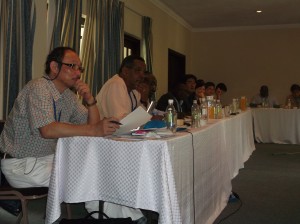
本プロジェクトでは「アフリカ紛争・共生フォーラム」を毎年1回、アフリカで開き、アフリカ諸国の研究者や実務者とともに国際的な議論を深めてゆきます。初年度の2011年12月には第1回の集まりをナイロビで、2012年12月には第2回をハラレで開催しました。
ハラレ・フォーラムでは、南部アフリカを対象として研究を続けてきたアフリカ人8人(基調講演をふくむ)と日本人7人の口頭発表がありました。また、前回のナイロビ・フォーラムが対象としたのは東アフリカ地域ですが、そのフォーラムに出席したアフリカ人3人、日本人4人もハラレ・フォーラムに参加しました。そして、紛争解決と共生の実現のために活用できる「アフリカの潜在力」とは何かについて、多様な視点から活発な意見交換がおこなわれました。
ハラレ・フォーラムでは、前回のナイロビ・フォーラムの成果をふまえて、参加する人びとには、まえもって以下の五つの質問を送りました。そして参加者には、自分の調査地での経験をもとにしながら、この質問に答えるかたちで2000~3000語のメモを用意してもらいました。そして、それをもとにして焦点の定まった議論をすることを試みました。
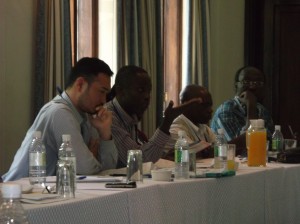
- 紛争の解決や社会的な和解と癒しのために有効に利用することができる「アフリカの潜在力」とは何か。「アフリカの潜在力」とはあいまいで多面的、かつ問題のある概念でありうるし、保守的、リベラル、あるいはラディカルなイデオロギーを内包しうる。また、この概念を南部アフリカのコンテクストで使うと、「誰がアフリカ人なのか」という、より基礎的な問題も提起するかもしれない。
- 「アフリカの潜在力」は、紛争解決の過程において、どのように機能しうるか。
- 紛争解決と正義の実現のためには、グローバルで普遍的なシステムが利用されることが一般的であるが、「アフリカの潜在力」は、そうしたシステムとどのように接合できるのか。
- 「アフリカの潜在力」には「有害な伝統的な慣行」がふくまれることもある。「アフリカの潜在力」を再評価して活用しようと考えるときに、どのようにして普遍的な正義という基準を満たし、人権を保護しうるのか。
- 南部アフリカの紛争パターンに、アフリカのほかの地域とは異なった独自のものがあるとしたら、それはどのようなものか。
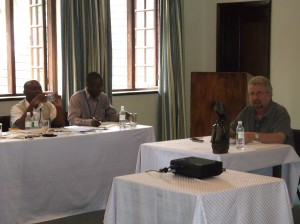
- What are African Potentials that can be utilized for conflict resolution, reconciliation and social healing? (the concept of African Potentials could be ambiguous, multifaceted and problematic including conservative/liberal/radical ideologies. It might raise a more fundamental question about who Africans are in Southern African context.)
- How can they work in a conflict resolution process?
- How can African Potentials be articulated with global/universal system of justice and conflict resolution?
- African Potentials may include “harmful” ones. How can pro-African Potentials orientations satisfy both of local and universal justice and protect human rights at once in addressing such “harmful traditional practices”?
- What are unique conflict patterns, if any, in a Southern African context that are different from those in other African regions?
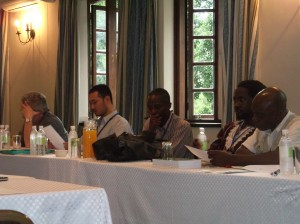
ハラレ・フォーラムのプログラムは、下記のとおりです。まず、研究代表者の太田至が趣旨説明をおこなったあと、アジスアベバ大学のインティソ・ゲブレさんから、前回のナイロビ・フォーラムやこの研究プロジェクト全体に関する批判的なコメントをいただきました。そのあと、CODESRIA(Council for the Development of Social Science Research in Africa: アフリカ社会科学調査振興評議会)の元会長で世界の農地改革に関する先鋭的な研究者であるサム・モヨさんの基調講演がありました。この講演でモヨさんは、アフリカ大陸における農地問題の現代史を概観して、その多様性といくつかの共通点を指摘し、また、南部アフリカにおける紛争の特徴を論じて、フォーラム全体の議論の方向を設定しました。
そのあと、5つのセッションにわかれて合計14件の口頭発表がありました。そこで取り上げられた事例は、農地改革(land reform)、土着の権利(autochthony)、主権の分有(power sharing)、地域内協力(regional cooperation)、人びとの和解と社会的な癒し(reconciliation and social healing)、日常的な紛争解決の方法(everyday conflict settlement)、精神世界の役割(spirituality)など、多岐にわたりました。そして参加者たちは、紛争の解決と共生の実現にむけて「アフリカの潜在力」をどのように活用できるのか、そして、南部アフリカに特徴的な現象とは何かについて、活発な議論をかわすことができました。
以下に掲載するのは、こうした口頭発表と議論から導き出された論点をまとめたものです。フォーラムの最後の総合討論では、この論点を参照しながら議論をかわしました。また、フォーラムの参加者たちは、成果の出版にむけて口頭発表の原稿を改訂することにしました。
議論された主要な課題(英文はここをクリック)
1.南部アフリカには、この地域独自の紛争のパターンがあるのか、また、あつかうべき独自の問題があるのか
- ヨーロッパ人入植者の問題、植民地主義、人種差別主義、資本主義の浸透(ネオ・リベラルなグローバル化の背景)
- 先住民からの土地の強奪といった暴力行使な歴史が重要な位置にあること
- 土着の人びとの権利(autochthony)、人びとの移住と多層をなす歴史、マイノリティの不安定な立場
- ネオ・リベラルな改革に対して、現地の権利を擁護する政治的・経済的ナショナリズムがおこっていること
- 「グッド・ガバナンス」および「伝統的価値」に対する二極化した見解、ハイブリッドな制度とは何か
- 外部のコンテキスト:安全保障と資源の争奪
2.紛争解決と共生を実現するために機能している「アフリカの潜在力」とは、どのようなものか
- 交渉のすえに合意すること:それに関与する者は、特定のアイデンティティを共有するような実体のある集団なのか
- 祖先に対する尊敬と歴史の所有者の問題:誰のための、誰にとっての歴史なのか
- 人間と自然に対する関係論的な見方:その開放性
- 地域に根ざした考え方、地域内部からの視点:文化的なアプローチとポリティカル・エコノミーのアプローチ
- 常に構築され、インベントされ続けること:それは実体をともなうのか、イメージのうえのことに過ぎないのか
3.紛争解決と共生を実現するにあたって「アフリカの潜在力」は、どのような局面で活用できるのか
- プロセスが重要であり、歴史との関連を見る必要がある。また、多層な焦点を考える必要がある(村、地方、国家、大陸、地球全体といった異なるレベル)
- 土地改革
- 生態及び資源管理
- (国民的)アイデンティティの表出、過去におこなわれた不正への対処
- 権力の分有、リージョナルな仲裁、紛争後の和解
- そのほかの議論すべき諸関係:階級間の関係、ジェンダー、家父長制など
- いつ、そしてどのような方法によって、「アフリカ潜在力」がうまく活用されたと判断するのか、そもそも、そのような測定ができるのか
4.慣習的でローカルな実践と公式なメカニズム(国家、リージョナルな組織など)をどのように接合することができるのか
- チーフの役割:それは制度化されるべきか。どの程度まで、どんな方法で?
- ふつうの人びとのエージェンシーについてどう考えるか:彼らの声は、どのようにして他者にとどくのか
- 国家による干渉:「捕捉されない」農民というとらえかた
- SADCは共同体として機能するのか:地域紛争、地域の治安体制、保護体制
- (普遍的)権利と(ローカルな)伝統の関係:両者の有害さ、両者の有用性、そして両者を複合したときの有害さと有用性
5.「アフリカの潜在力」と「アジアの潜在力」の共通点はどこか
プログラム
December 7 (Fri.)
- 19:00 – 20:00 Registration
- 20:00 – 22:00 Reception (Restaurant Emannuels)
December 8 (Sat.)
- 9:15 – 9:30 Itaru Ohta (Kyoto University)
- Introduction: Purpose of the Harare Forum
- 9:30 – 9:45 Gebre Yntiso (Addis Ababa University)
- Comments on the Nairobi Forum held in 2011
- 9:45 – 10:15 Keynote Speech:Sam Moyo (African Institute for Agrarian Studies)
- African Potentials: Southern Africa’s Conflict Regime
- 10:15 – 10:35 Break
- (1) 10:35 – 11:05 Donald Chimanikire (University of Zimbabwe)
- Zimbabwe’s discourse of national reconciliation and conflict resolution: The cases of Reconciliation, The Unity Accord, The Global Political Agreement (GPA) and National Healing
- (2) 11:05 – 11:35 Grasian H. Mkodzongi (University of Edinburgh)
- Land reform, land conflicts and the dynamics of authority after land reform in Zimbabwe 2000–2011
- (3) 11:35 – 12:05 Kazuhito Suga (I-i-net, Japan)
- Effect of African potentials on conflicts after Fast Track Land Reform in Zimbabwe –
- 12:05 – 12:15 Comments on the Session 1
- Gebre Yntiso (Addis Ababa University)
- 12:15 – 14:00 Lunch
- (4) 14:00 – 14:30 Yoich Mine (Doshisha University)
- Sharing and dispersing power in the African perspectives: A research note on African Potentials
- (5) 14:30 – 15:00 Yoko Nagahara (Tokyo University of Foreign Studies)
- History as an African Potential: ¬Conflict and Reconciliation in Relation to Namibia’s Colonial Past
- (6) 15:00 – 15:30 Mitsugi Endo (University of Tokyo)
- African Potentials in the context of Southern Africa
- 15:30 – 15:40 Comments on the Session 2
- Edward Kirumira (Makerere University)
- 15:40 – 16:00 Break
- (7) 16:00 – 16:30 Rumi Umino (Tokyo Metropolitan University)
- Living with conflicts: Being “indigenous” in South Africa, and beyond
- (8) 16:30 – 17:00 Lungisile Ntsebeza (University of Cape Town)
- Resolving conflict and ensuring peaceful co-existence in South Africa: Any role for land?
- (9) 17:00 – 17:30 Toshihiro Abe (Otani University)
- Lawyer Mandela’s court tactics and the potential function of the South African TRC
- 17:30 – 17:40 Comments on the Session 3
- Eisei Kurimoto (Osaka University)
◎Session 1: Dynamics of Conflict Resolution in Zimbabwe
◎Session 2: Power-Sharing, Mediation and Reconciliation in Southern Africa
◎Session 3: Peopling and Conflict Resolution in South Africa
December 9 (Sun.)
◎Session 4: Land and Conflict in Zambia
- (10) 9:15 – 9:45 Richard Zulu & Chileshe L. Mulenga (University of Zambia)
- Conflict resolution: Lessons from Zamba
- (11) 9:45 – 10:15 Shuichi Oyama (Kyoto University)
- The People’s anger killed a chief and his spirit protects the territory: Inequality and local resolution of land allocation under the new 1995 Land Act in Zambia
- 10:15 – 10:25 Comments on the Session 4
- Kennedy Mkutu (United States International University)
- 10:25 – 10:45 Break
- (12) 10:45 – 11: 15 Wilbert Sadomba (University of Zimbabwe)
- Potential of African philosophy in conflict resolution and peace-building
- (13) 11:15 – 11:45 Euclides Gonçalves (Centro de Estudos Sociais Aquino de Bragança)
- The politics of persuasion: The influentes and the conflict resolution in Mozambique
- (14) 11:45 – 12:15 Michael Neocosmos (University of South Africa)
- Thinking the Resolution-of-Contradictions-Among-the-People in Africa and the politics of social healing (some theoretical notes)
- 12:15 – 12:25 Comments on the Session 5
- Motoji Matsuda (Kyoto University)
- 12:25 – 14:00 Lunch
- 14:00 – 16:00 General Discussion (Chair: Yoich Mine)
◎Session 5: African Potentials in Perspectives
[第1回アフリカの紛争と共生 国際フォーラム(ナイロビ)](2011年12月02-04日開催)
日 時:2011年12月2〜4日
場 所:ナイロビ Silver Springs Hotel
概要
本プロジェクトでは、とくにアフリカ人研究者・実務者をまじえて国際的な議論を深めるために、「アフリカ紛争・共生フォーラム」を毎年アフリカ各地で開催することにしています。2011年度には、その第1回をナイロビで開催しました。
このフォーラムには、アフリカ5カ国(ケニア、エチオピア、南スーダン、ウガンダ、タンザニア)からそれぞれ二人ずつ合計10人を招へいし、日本からは本プロジェクトのメンバー6人が参加しました。参加者には、まえもって以下の三つの質問を送り、それに答えるかたちで2000~3000語のメモを用意してもらって、会議の当日には、それをもとにして議論をしました。
(1)アフリカの紛争解決や和解、社会的な癒しを実現することに貢献することが可能な、アフリカの潜在力とは何か
(2)アフリカの潜在力を活用した紛争解決・和解の試みの萌芽があれば具体的に示してほしい
(3)紛争処理における、普遍的正義を保証するための国際的枠組(たとえばICC)と、アフリカの潜在力を活用した上記の枠組とはどのような関係であることが望ましいか
1. What is African Potentials that can materialize conflict resolution, reconciliation and social healing?
2. Do you know any examples of trial in which African Potentials are utilized in conflict resolution and social healing?
3. In conflict resolution, international frameworks (such as ICC) are often utilized in attempts to secure universal justice. What kind of relations is desirable between African Potentials and such international frameworks? How can they be articulated?
プログラム(各発表の要旨を読むためには、タイトルをクリックしてください。
また、ここをクリックすれば要旨全部をまとめて読むこともできます)
December 2
- 18:00-19:00 Registration at Ostrich Conference Room
- 19:00-21:00 Welcome Dinner at the Hotel
December 3
- 9:00-9:30 Itaru Ohta (Kyoto University)
- 1. African Potentials, Customary Knowledge and Institutions, and Persistent Face-to-face Interactions
- 9:30-9:55 Eisei Kurimoto (Osaka University)
- 2. Limits and Possibilities of “African Potentials” in Conflict Resolution and Co-existence: Towards an Endogenous Approach of Peace- building
- 9:55-10:20 Gebre Yntiso Deko (Addis Ababa University)
- 3. African Peace Potentials: Insights from Ethiopia
- 10:20-10:35 Break
- 10:35-11:00 Kennedy Mkutu (United States International University)
- 4. African Potentials for Conflict Mitigation in and around Kenya
- 11:00-11:25 Fekadu Adugna Tufa (Addis Ababa University)
- 5. Assessing “African Potentials” among the Pastoral Somali and Oromo in Southern Ethiopia
- 11:25-11:50 Mikewa Arunga Ogada (Centre for Human Rights and Policy Studies)
- 6. A Research Note on the Work of Clerics-Led Peace Committees in Kenya’s Coast
- 11:50-12:15 Haji Abdu Katende (Makerere University)
- 7. The Strength of African Conflict Resolution Potentials
- 12:15-13:35 Lunch Break
- 13:35-14:00 Samson Wassara (University of Juba)
- 8. “African Potentials” from South Sudan
- 14:00-14:25 Toshimichi Nemoto (Japan Tanzania Tours Ltd.)
- 9. Peaceful 50 years of Tanzania
- 14:25-14:50 Simwana Said (Tanzania Center for Foreign Relations)
- 10. Tanzania Conflict Management within Great Lakes Region and the Horn of Africa
- 14:50-15:05 Break
- 15:05-15:30 Naoki Naito (The University of Tokushima)
- 11. Coping with the State and Non-state Actors: Lessons from Local Peace Building Practices in Kenya
- 15:30-15:55 Toru Sagawa (Kyoto University)
- 12. Relational Networks and Peace-Making in East African Pastoral Societies (South Omo)
- 15:55-16:20 Simon Monoja Lubang (University of Juba)
- 13. Conflict resolution and potential in African context
- 16:20-16:35 Break
- 16:35-17:00 Edward K. Kirumira (Makerere University)
- 14. Local Communities as Agency in International Conflict Conciliation Frameworks: Re-visiting African Potentials
- 17:00-17:25 Motoji Matsuda (Kyoto University)
- 15. Beyond Romanticization of Customary Mechanism of Conflict Resolutions: Notes for Further Discussion
- 17:25-18:00 General Discussion
December 4
- 9:30-11:30 General Discussion
議論された主要な課題
■本フォーラムの第一日目には、合計15の報告がなされたが、そのなかから以下の共通の問題点が浮き彫りになった。第2日目には、こうした課題についてさらに議論を重ねた。
(1)紛争解決のためには、国家が用意しているメカニズム、制度、枠組み(たとえば裁判所)があるが、それと、在来の・慣習的な・伝統的なメカニズムとは、どのような関係にあるのか(あるべきなのか)
- 双方は、補完的、協力的なものなのか。在来のメカニズムは、国家の枠組みから、どれだけ独立し、自律的なのか。国家によって、公式に、法的な認可を受ける必要があるのか(そもそも、「法の支配」とは何か、「法」とは何か)
- 国家や都市在住のエリートたちは、在来のメカニズムを利用したり、操作したりすることによって、より強力な権力をふるうことはないのか、それは不可避なのか(国際機関やNGOではたらくものたちは、どうか)
- 国家が人びとを保護しないとき(国家が不在のとき)、在来のメカニズムは重要になると考えられるが、それはどのように活用できるのか
(2)在来のメカニズムがはたらくところ(空間)は、どのようなものか
- それは、国家権力が不在であるような周辺地域において、コミュニティのレベルではたらくだけなのか
- 在来のメカニズムは、(国家権力が不在である地域で、その)オルタナティブとして活用されるだけのものなのか、あるいは、たとえば国際紛争の解決のために活用できるような、もっと魅力的なものなのか(そうであれば、どのようにして?)
(3)「アフリカの潜在力」「アフリカの知識」「アフリカの知恵」「アフリカの哲学」「アフリカ的な実践」とは、何か。
- それは、国家によって現実化するものか、より大きな地域によってか、あるいは、より小さなコミュニティや慣習を共有する集団か、あるいは個人によって現実化するものか。
- もし、このように複数のレベルではたらくものであれば、異なるレベル間は、どのように接合することができるのか。
- アフリカの潜在力は、人びとの日常生活にねざしたものと語られるが、常にそうでなければならないのか(政府やNGOの介入による草の根の平和構築プログラムをどう考えるか)
(4)グローバルで普遍的な枠組み・基準・価値とアフリカ的な枠組み・基準・価値
- 在来の慣習には、「よいもの」と「わるいもの」があるのか、誰がそれを判断するのか、在来のメカニズムは人権侵害をおこすのか(特に女性と子どもたちに対して)、「政治的に正しくない」側面をどう考えるか
- グローバルな枠組みでは個人が重視されるが、在来の枠組みでは集団が重視されることをどう考えるか(たとえば相互に争った二集団の和解を考えるとき、近親者を殺された個人の感情を重視するか、集団としての和平を優先するか、個人の不平不満をどうあつかうのか)
(5)伝統、慣習、あるいはジャスティス(正義?)、真実、和平といった概念をどのように定義するのか
- 「伝統的(在来の)権威」「伝統的(在来の)メカニズム」とは、どこまで「伝統的(在来)」なのか(それは、コロニアル、ポストコロニアルに、ねつ造されたものではないのか)(ステレオタイプな伝統観をどうするか)(近現代の変容の問題をどうするのか)
- 修復的正義と応報的正義
- 顕微鏡的な(具体的な証拠をともなう)真実と対話的な(ともなわない)真実
- ポジティブな平和(貧困、抑圧、差別などの構造的暴力がない状態)とネガティブな平和(戦争がない状態)
